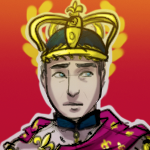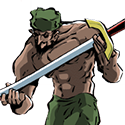|
THE LESBIATHAN posted:I can't free him from death! Not with that attitude you can't.
|
|
|
|

|
| # ? Apr 28, 2024 08:40 |
|
Chapter 24: Conquest Mstislav's first act upon returning to Novgorod is not to hold a festival or parade in his honor; instead he visits to Khram Yarilo to ask Jarilo to surround him with companions and friends. While there are plenty of Norse prisoners to sacrifice to the gods, Mstislav instead chooses to give up an eye, hoping to prove his devoutness to the veche and people of Ilmenia. Unfortunately, the procedure to remove the eye doesn't go exactly as planned and the wound becomes infected.    While Mstislav is confined to his bed to recover from his show of devotion, his kinsman Chief Terentiy pays him a visit while he's in Novgorod for business. The short visit turns into a longer stay, as the two realize they have quite a bit in common and by the time Chief Terentiy must return home, Mstislav has made up his mind that Chief Terentiy will be the next tysyatsky; he uses his connections in the veche to make sure this is the case.  913 brings the first instance of a hospital being opened in Novgorod, as Mstislav and the veche fund a series of apothecaries in and around Novgorod. While they mostly practice traditional Slavic medicine with a smattering of Greek medicine, its still a huge leap forward for health within and around the city.  In December, the King of Poland proposes a marriage between his oldest daughter and Mstislav's oldest son; Mstislav accepts, seeing no reason why the two strongest Slavic powers shouldn't share a common blood. 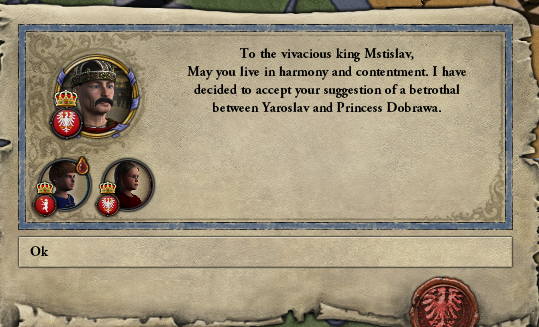 The Karelians, now exiled to their holdings in and around the city of Chud, decide that the middle of February in the dead of winter is the perfect time for them to invade the vastly superior Ilmenia for a city that was never actually part of his chiefdom.  Mstislav, still sporting an infected eye socket, is ordered by the veche to remain in Novgorod to continue his recovery, while his commanders go out and do the actual fighting. Forced to remain home, Mstislav gives into his baser desires and finds his way to the bed chambers of one of his distant cousins. The fling results in his cousin becoming pregnant; Mstislav does his best to cover the whole affair up, but Gorislava's husband, a Greek Ilmenian, finds out and tells the whole court, embarrassing Mstislav. 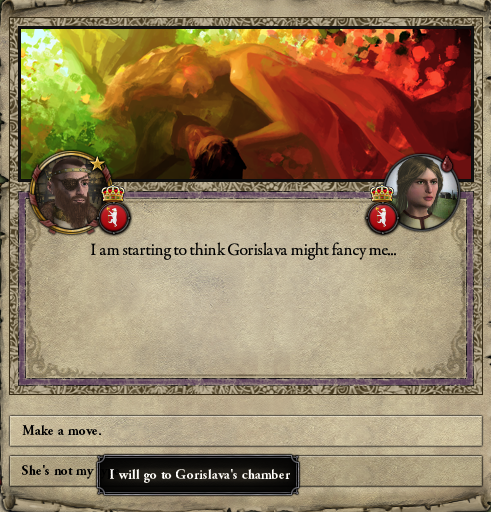   The war against the Karelians ends without a single engagement by the main Ilmenian army; apparently the the chiefs of the realm are more than capable of handling an upstart Mordvin. Peace is made in September. 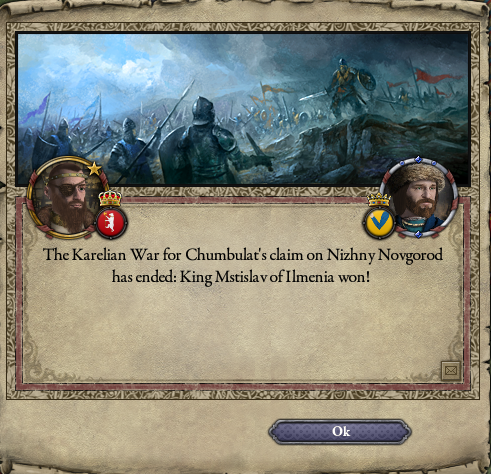 The child from Mstislav's one night stand is born in December; Mstislav names her Liubava, after his wife, and legitimizes her, much to the pleasure of her mother and the displeasure of literally everyone else.  Mstislav's infection finally clears up at the start of the new year, almost as if the gods are rewarding him for his honesty about his affair. Finally able to leave his family's estate in Novgorod, Mstislav decides to spend some time at the sacred gardens of Khram Yarilo, tending them with the priests. The experience helps Mstislav understand something about patience and how to carefully manage the realm.  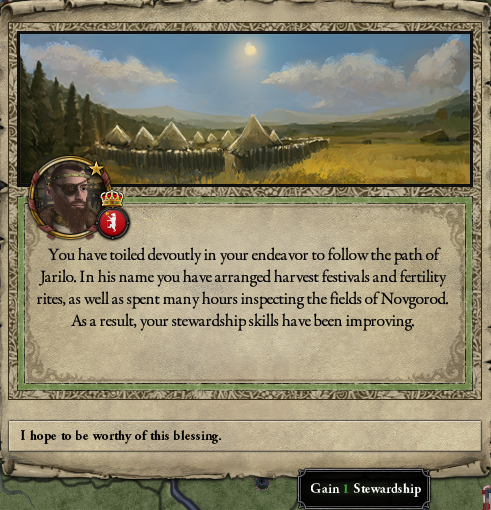 The rumors of Mstislav's affair continue to hound him and, eventually, his wife asks if he's still seeing Gorislava; the truth is, Mstislav has continued to see Gorislava, but has attempted to keep it quiet. Mstislav lies to his wife, saying that it was simply an ill-advised one night stand. Still not convinced, his wife enlists Gorislava's husband to help her determine if Mstislav is telling her the truth. When Ioustinianos approaches Mstislav to broach the subject, Mstislav flatly denies that the affair is still ongoing and then hurries off to check the status of the city's army; this pattern continues until, finally, Ioustinianos gives up.   In November of 916 the head of the Khram Yarilo, a priestess Vseslava, beings spouting heretical ideas about who should be the most venerated god in the reformed Slavic faith. While the majority of the veche and Mstislav agree with her, when she starts preaching war against Ilmenia's Polish allies, they have her quietly removed from her position, before appointing a less vocal priest.   Mstislav also tries to salvage his slowly crumbling marriage, using a tried and true method: showering his wife in gifts; in 918 he imports several lesser kestrels from the Byzantine Empire as a gift for her. The bird proves to be a hit with the court and soon all the major families of Novgorod and Ilmenia are importing and breeding them, setting off a craze for falconry and bird breeding. Liubava loves the bird and the fact that she's on the cutting edge of fashion, and it seems that all is forgiven. 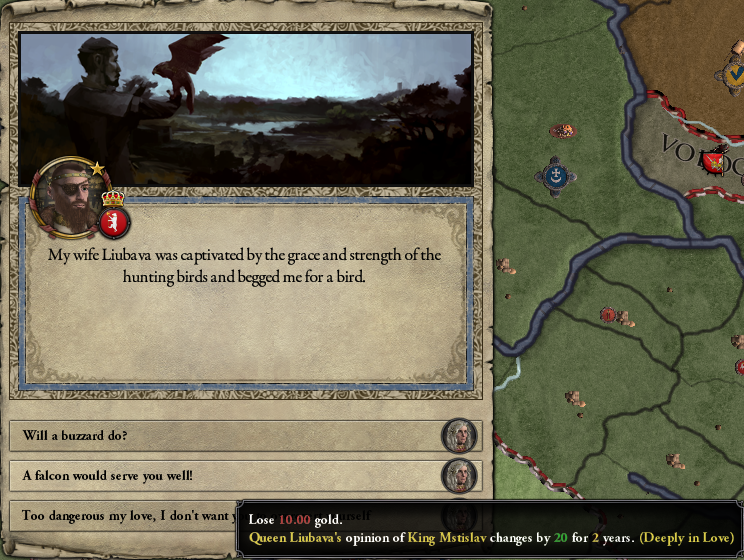 While Mstislav spends money on birds, the veche begins construction on the Dom Veche, or the Veche House, a grand building where the Novgorodian veche will meet and discuss laws and decisions that will affect all of Ilmenia; previously, the veche was housed in a small, wood hall in the center of the city. The Dom Veche promises to be a monument to both Novgorod, Ilmenia, and the veche itself, as the Novgorodian Greek artisans and architects are called upon to make a building that will be instantly recognized by anyone entering the city. 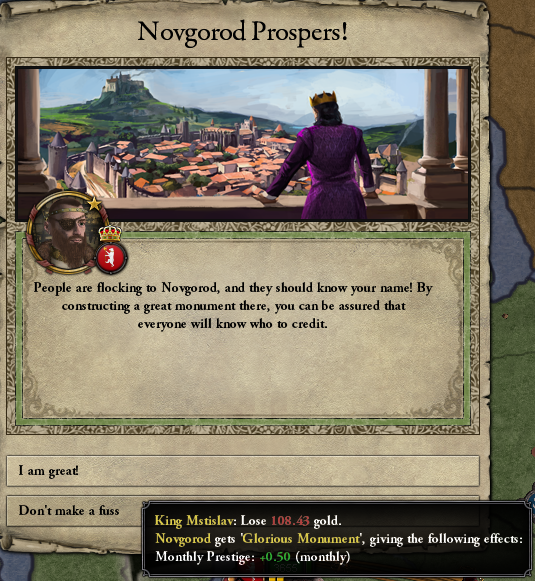 Not to be outdone, Mstislav approaches the veche for a declaration of war against the Swedes; he plans to remove the last major Norse settlement from Finland and claim it for Ilmenia. The veche sees no problem with this, and war is declared in May of 918. 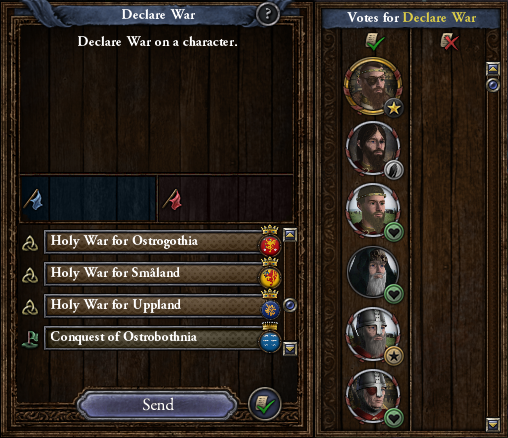 The Mordvins of Mozhaysk almost immediately rise up in revolt; the Mordvins are quickly becoming the new Estonians, at least in terms of annoyance. 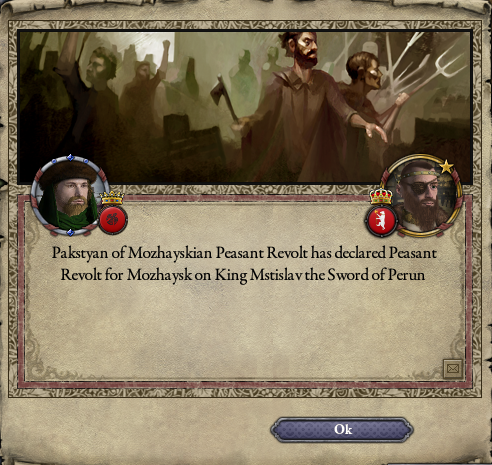 Mstislav turns his army south, cursing the Mordvins the entire way to Mozhaysk. The Mordvins accommodate the tysyatsky and meet the Ilmenian army at Moskva, where they are defeated in November of 918.  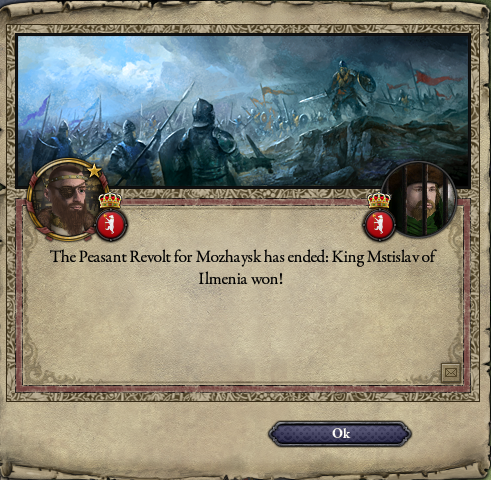 Mstislav once again calls upon the merchants and traders of the realm to provide him with boats; they happily provide, though they do ask for reimbursement. Thanks to this, the Ilmenian army is able to rapidly reach Finland and land in Swedish Finland in May of 919, where they defeat a large Swedish army at Austerbotn. Austerbotn falls not long after.  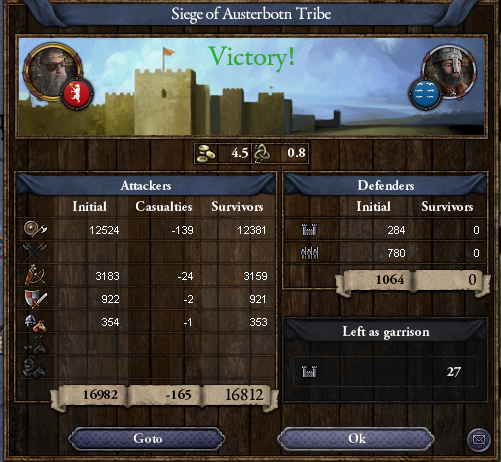 Mstislav then has the Ilmenian army cross over to the Swedish island of Ċland, which acts as the major staging point for the Swedes to invade Finland; thanks to the Ilmenian victory at Austerbotn, the Swedes are completely unable to oppose the Ilmenians from taking the island. 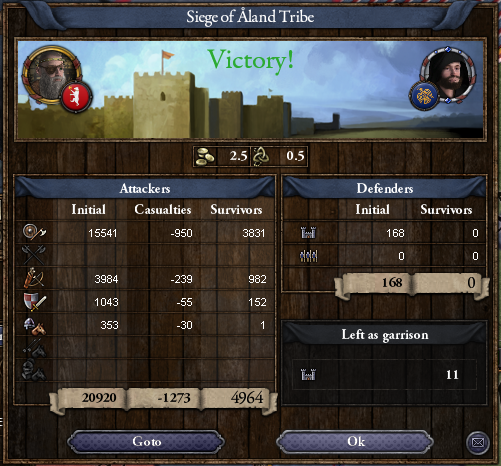 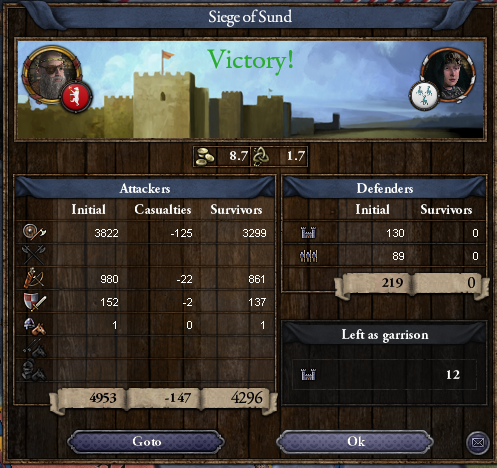 Of course, just because the Swedes can't oppose the Ilmenians on land doesn't mean they can't fight back in other ways; raiding on Ilmenian merchant ships increases, as the Norse try to win back some of their lost pride and, after the merchants responded to his call for aid, there is no way Mstislav can deny them new ships and supplies.  Controlling Ċland turns out to be a huge boon to the Ilmenians, as in both 920 and 921 they are able to repel a large Swedish invasion force.   Worried about being able to pay for his armies, Mstislav approaches the Khram Yarilo for help; the priests of Khram Yarilo agree, though only on the condition that they be given a seat in the Novgorodian veche. Mstislav agrees and Ilmenia finds itself back in the black.   The Swedes try one last invasion in May of 921, marking their third such attempt; they are defeated once again and soon King Witikind is asking for peace. Austerbotn, renamed to Ostrobothnia in official Ilmenian records, and the surrounding areas are given to Ilmenia, removing the last major Norse settlement in Finland. 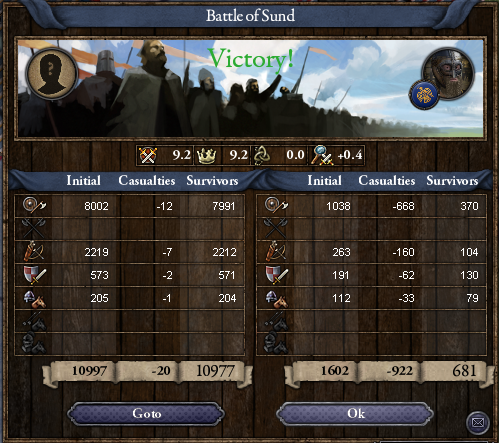  The Swedes decide to take a different approach in winning over Finland and Ilmenia: they start to send Norse priests to Finland and Ilmenia, hoping to convert the areas and rulers to their religion. Mstislav doesn't give them a chance to even try, as they are hunted down and burned at the stake; Ilmenia and Finland will remain Slavic. 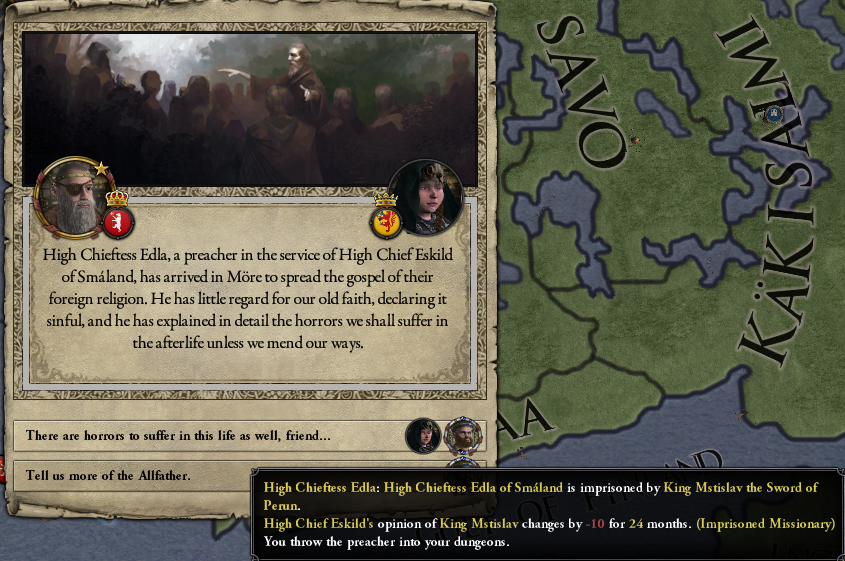 Mstislav only rests for a short time, and in October of 921, only a few months after his victory over the Swedes, he decides to remove the last independent Sami tribe, the long exiled High Chiefdom of Murom.  Murom has some initial advantage over the Ilmenians, if only because Mstislav and his army must first join up together before they can march against the Sami tribe, so the cities of Kola and Kantalahti fall to them, before the Ilmenians defeat them at the Finnish city of Umba.  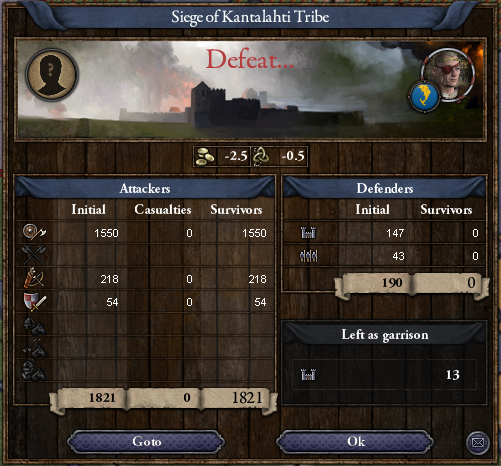 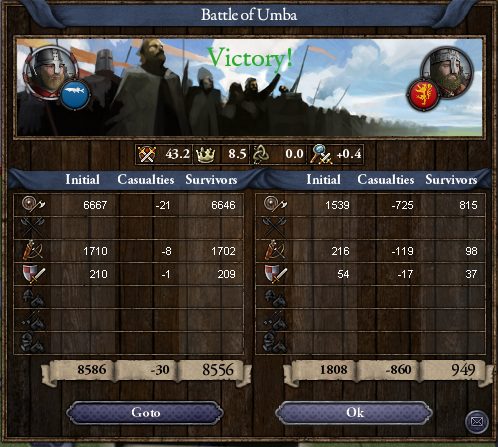 Kola and Kantalahti are reclaimed for Ilmenia, before Ruija, the capital of Murom, falls to Mstislav's army in November of 922, bringing the war to a victorious conclusion. 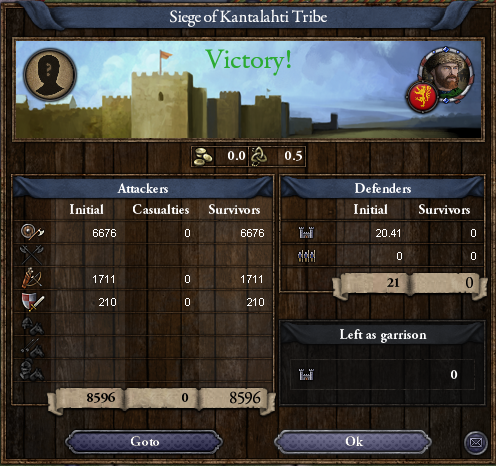   Mstislav has expanded Ilmenia more than any other ruler before him, except, possibly, for Briachislav or Ruslan and its expect by the veche that, in his advanced age, he will now retire to a quiet life in Novgorod to rest on his victories, only calling forth the armies of Ilmenia for the odd raid or defensive war. Instead, Mstislav approaches them for a new holy war to claim Bjarmia from the Khazars in September of 923.  Ilmenia divides the two halves of the Khazar Khaganate and Mstislav uses this to his advantage, as he starts putting pressure on Bjarmia by seizing the city of Pomorye, though perhaps "seizing" is the wrong word, as the native Nenet rulers happily welcome Mstislav and his army into the city; apparently Slavic priests have been amazingly successful at converting the Nenet chiefs to the Slavic religion and the whole area is apparently Slavic as a result. In fact, the Nenet chiefs were the primary supporters of the Slavic rebellion against the Tengri Khazar khans. The Nenets of Pomorye also offer tribue to Mstislav, promising to swear eternal loyalty to him if he can free them from the oppressive Khazars. 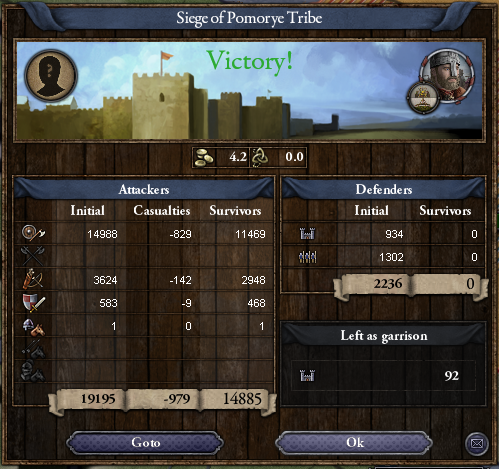 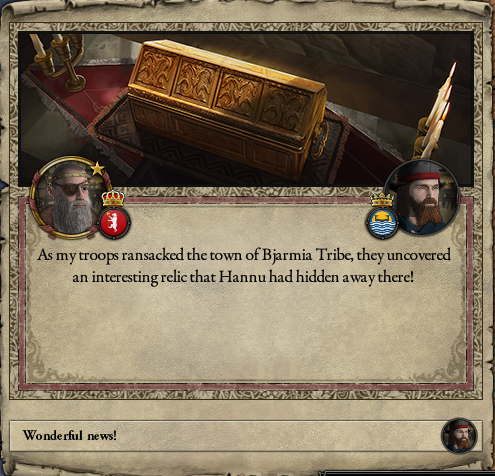  This trend continues through out Bjarmia, as city after city welcomes Mstislav with open arms, until in August of 924 the entire area is under Ilmenian control, with barely any loss of life.   924 also brings some concerning news from western Europe: the great city of Rome, the home of the Catholic Pope, has fallen to the Pope's Saxon bodyguards, and instead of just looting the city and leaving, they have claimed it as their new home. Lead by Chief Waldered, these Saxons have also ousted the Pope from his home at the Archbasilica of St. John Lateran, sending him running to the Franks for help. Safety secured by the Frankish emperor, Pope Nicolaus declares a holy crusade to retake the city for Catholicism. The age of crusades has begun.  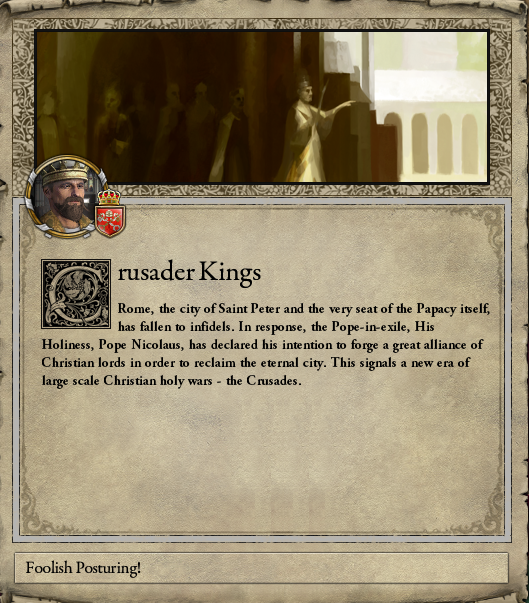 Though the news of these so called "crusades" is somewhat concerning for Ilmenia, Mstislav has much more immediate concerns and, after all, Rome and the Western Roman Empire is mighty far away. The Ilmenian army continues to expand its control over Bjarmia and the neighboring region of Ugra, hoping that by solidifying their position, the Khazars will get the message and surrender the land to Ilmenia.   While Mstislav continues to thrash the Khazars, the veche creates the title of High Chief of the Karelians, which is handed off to one of Mstislav's relatives who aided in the conquest of the region.  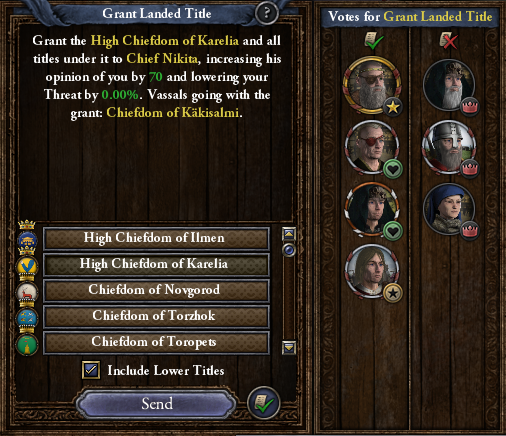 The Orthodox faith continues to have some sway within Ilmenia, as one of Mstislav's sons converts to the heathen religion in late 925. Though it pains him, Mstislav backs the veche's move to strip young Illiya of his lands in Kostroma; not wanting to fight his father in a war, Illiya agrees to the veche's demands, though he still remains Orthodox. 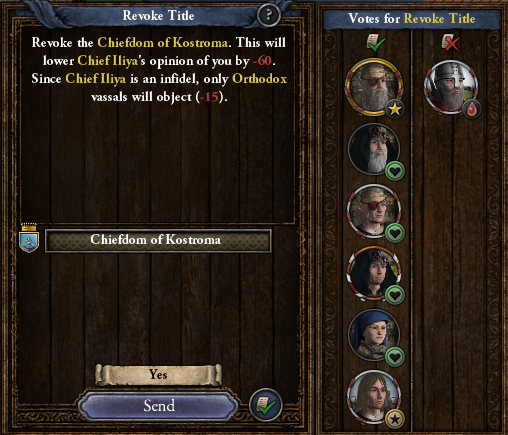 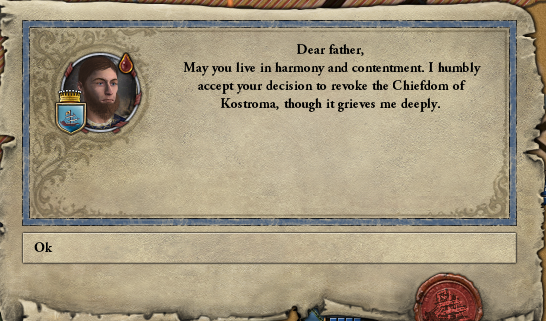 In March of 926 the Khazars finally realize that there's no way they can take back Bjarmia from the entrenched Ilmenians and so they cede the whole region to the Ilmenians. 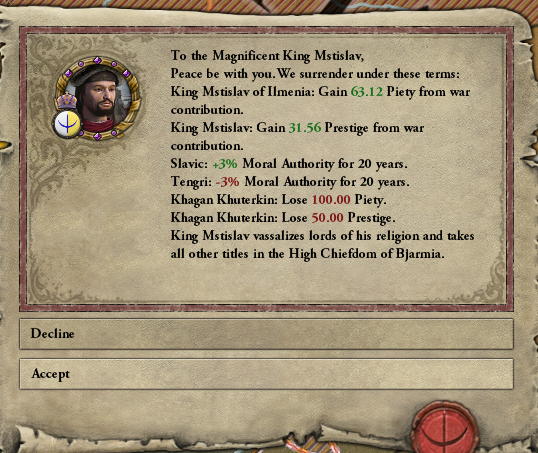 The veche raises up Chief Yevstafiy of Suomi to the status of High Chief of all the Finns the same month, putting Finland in the hands of two of Mstislav's distant relatives. 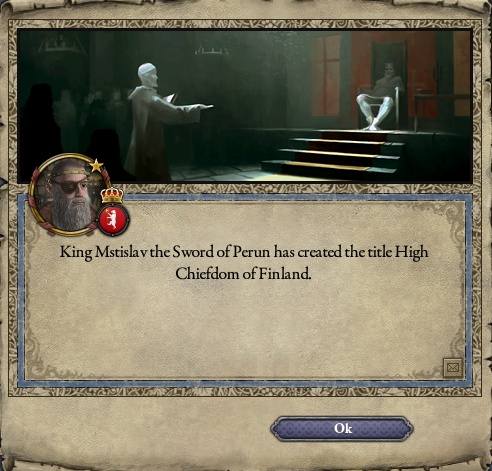  Chief Terenity, who participated both in the holy war for Norwegian Finland and the holy war for Bjarmia, is also appropriately rewarded as Mstislav grants him the title of High Chief of Courland without the veche's explicit endorsement; after the fact, the veche would back Mstislav's appointment, but only because Terenity is so well loved by the Curonians. Ilmenia is rapidly becoming dominated by the Slovenskys.   Finally, both the veche and Mstislav agree to make Chief Num of Pomorye, a Slavic Nenet, the Chief of all the Nenets, granting him control over almost all of Bjarmia; there's some push back by the more conservative members of the veche, who don't wish to see a non-Ilmenian given such immense power and to appease these voices, Chief Num is not made a high chief, placing him on the lowest rung of tribal status.    In April, Mstislav develops a terrible rash; it quickly become apparent that this is no normal rash but is in fact the Great Pox.   Mstislav orders his court physician to heal him no matter the cost and, after some deliberation, Nikita uses an old Suomenusko remedy, which leaves the tysyatsky feeling amazing. 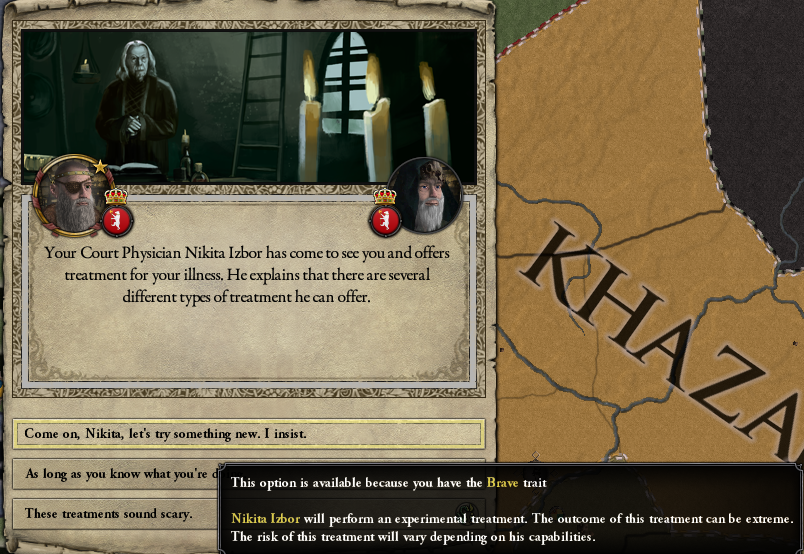 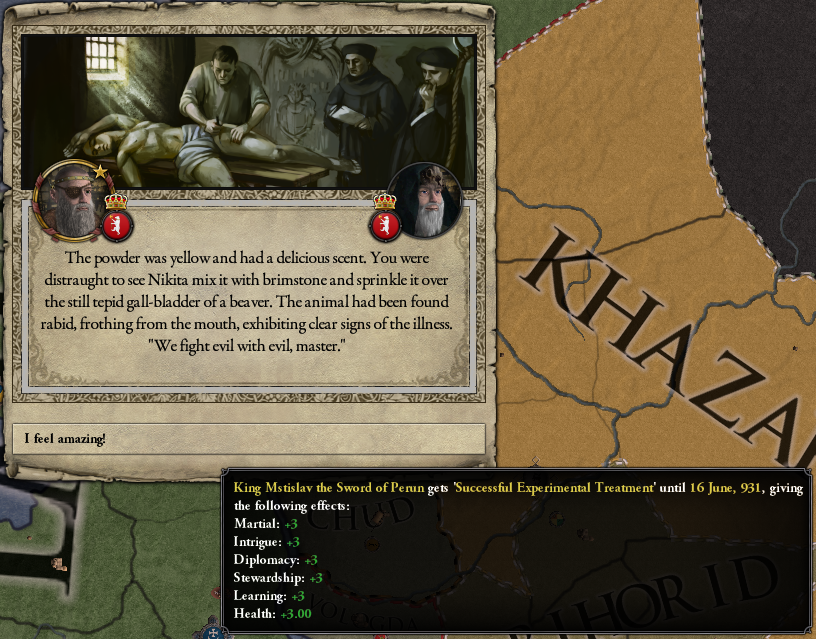 Nearly two years after the pope's declaration of a crusade to reclaim Rome, High Priest Szczesny declares a new age of "great holy wars;" like the Ilmenians with the Greeks, the Polish clearly have no problem with stealing the ideas of their neighbors.  The veche continues to expand its influence in reaction to the creeping power of the Slovenskys; with this latest set of laws, they claim the power to fully intervene in wars between vassal chiefs. 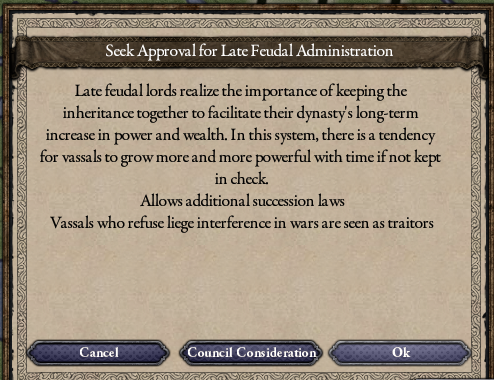  At the start of the new year, news from Poland arrives: High Priest Szczesny has declared a Great Holy War for Germany against the Western Roman Empire. Mstislav doesn't waste time and almost immediately asks the veche to allow him to join in on the war; while he isn't a huge fan of the Polish dominated church, he does see the value of splintering the Western Romans and placing a friendly Slavic buffer state between it and the Kingdom of Poland.    Mstislav gathers his armies and calls upon the numerous ships available to him and, in September of 927, he lands at Lübeck and the city falls shortly after. The Ilmenians have arrived.  Unfortunately, that feeling of victory doesn't last long, as the Frankish armies engage the Ilmenians at Travemünde. Perhaps overconfident of his ability, Mstislav charges headlong into the fray, but the Franks are nothing like the Norse or the Finnish tribes he spent his life conquering and they do not break so easily. Instead, Mstislav is grievously injured and his commanders, after recovering their tysyatsky, call for a retreat.   Mstislav survives for one more month, before dying on January 4, 928 as the Ilmenians retreat from the Franks. His personal guard breaks off from the main army and marches back to Novgorod to return their leader to his home. Raised to the position of tysyatsky from being a prisoner of the tyrant tysyatsky, truly Ilmenia has lost a great leader.  History remembers Mstislav as Tysyatsky Mstislav Vtoroy Mech, often translated as Mstislav the Second Sword.
|
|
|
|
Yeah, going to war with the big boys as a tribal ruler rarely ends well.
|
|
|
|
Revelation 18:2 posted:And he cried mightily with a strong voice, saying, Babylon the great is fallen, is fallen, and is become the habitation of devils, and the hold of every foul spirit, and a cage of every unclean and hateful bird.
|
|
|
|
The Norse are sending priests? I haven't played much with pagans, I thought unreformed pagans couldn't proselytize outside of their lands?
|
|
|
|
catlord posted:The Norse are sending priests? I haven't played much with pagans, I thought unreformed pagans couldn't proselytize outside of their lands? Its entirely possible that Sweden had their court diviner trying to convert Austerbotn and when we took it over we got stuck with them, so the event fired. Either way, it was too funny not to mention; they think they're a real religion!
|
|
|
|
Can we convert them now that we've organized?
|
|
|
|
Yes, but that'd be giving up the ability to holy war them.
|
|
|
|
Crazycryodude posted:Can we convert them now that we've organized? Yes but reformed pagans have a terrible chance of converting anyone and the Norse aren't willing to covert till about 1000 anyways; pagans really hate anyone trying to convert them before that date. THE LESBIATHAN fucked around with this message at 14:52 on Nov 30, 2017 |
|
|
|
Briefly making political enemies into Court Chaplain and sending them to proselytize could be a fun and interesting way to get rid of them if the veche won't agree to imprisoning them or whatever.
|
|
|
|
i can't find the list of mods used in this but I will be following all the same
|
|
|
|
Herr Tog posted:i can't find the list of mods used in this but I will be following all the same There's none, besides the personal modification I made that makes navigable rivers count as coastal provinces. Oh and also I did something that I don't want to spoil right just now.
|
|
|
|
THE LESBIATHAN posted:There's none, besides the personal modification I made that makes navigable rivers count as coastal provinces. Oh and also I did something that I don't want to spoil right just now. Niiiice, gonna learn from this about the earliest starts. What DLC is in play?
|
|
|
|
Herr Tog posted:Niiiice, gonna learn from this about the earliest starts. What DLC is in play? Everything but Jade Dragon and Sunset Invasion (which I have, but is not active).
|
|
|
|
Chapter 25: Instability Rodislav is elected tysyatsky following his grandfather's death; like his grandfather before him, Rodislav is diligent and humble and overall considered to be a fairly nice guy. Unlike Mstislav, he's also built for war, possessing a brawny body and a bravery rivaled only by Briachislav. Of course, what Rodislav also believes he's the prophet of Jarillo, set to save Ilmenia from the Perunian Polish heretics; Rodislav is also wise enough to not publicize this fact. 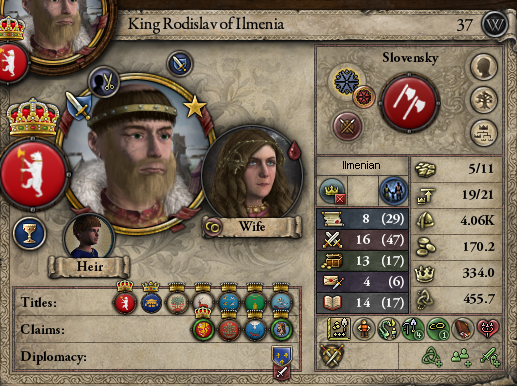 Of course, not everyone is happy with Rodislav being elected tysyatsky and Rodislav's cousin Iliya declares himself the tysyatsky of Ilmenia in exile and establishes his court in Saaremaa. Thankfully, besides Iliya and a few dissenting veche members who don't wish the tysyatsky to become hereditary, most of the chiefs scoff at Iliya and promptly pledge themselves to Rodislav.  Rodislav sees his ascension to the office of tysyatsky during the Great Holy War as a sign from Jarilo that now is the time to strike back against the Perunians in Poland; he forms a secret cabal for others who believe like he does, calling it the Voiny Yarilo, or Warriors of Jarilo. While right now the Voiny Yarilo only includes himself, one day Rodislav hopes that they will be strong enough to force the church to accept the light of Jarilo. 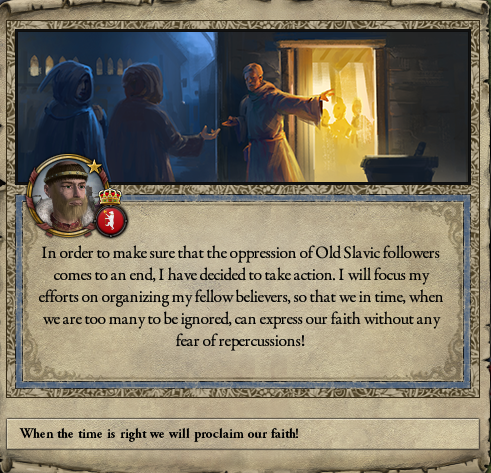 Rodislav has no interest in fighting in the Great Holy War called by the corrupt and heretical Perunian church, so instead he convinces the veche that allowing Iliya, no matter how small his realm currently is, to continue masquerading as a legitimate tysyatsky undermines not only his power, but the power of the veche. The veche agrees, and war is declared on Iliya in April. Iliya isn't completely unprepared, as he has been working to gain the support of Ilmenia's traditional enemies; the Prussians, Severians, and Suomenusko tribes have all pledged to help Iliya, should Rodislav attack him, seeing the advantage of propping up Iliya as a legitimate pretender to the office of tysyatsky. 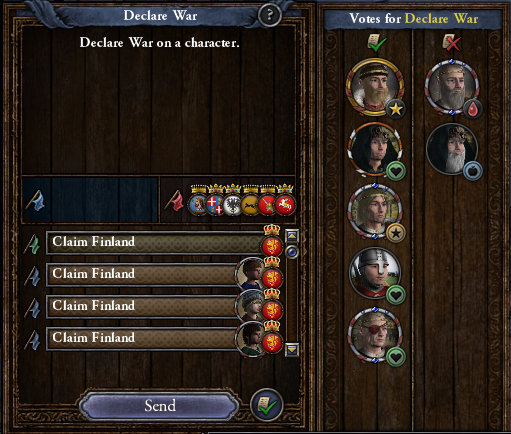 The Mordivins of Mozhaysk rise up not too long after war is declared, hoping to gain their independence and rejoin their Suomenusko brothers. 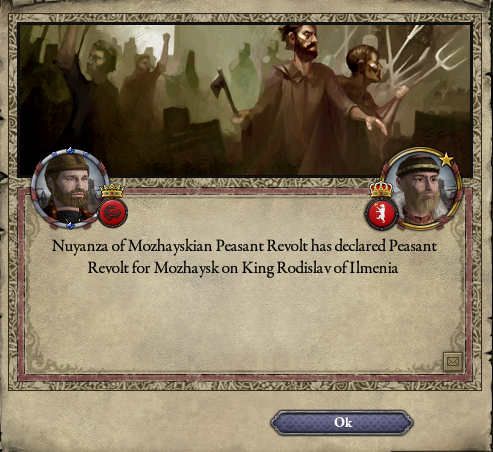 The pro-Iliya alliance attacks on all sides, hoping to force Rodislav to split his army to deal with them. While the Ilmenians have a few victories, their losses are far more.   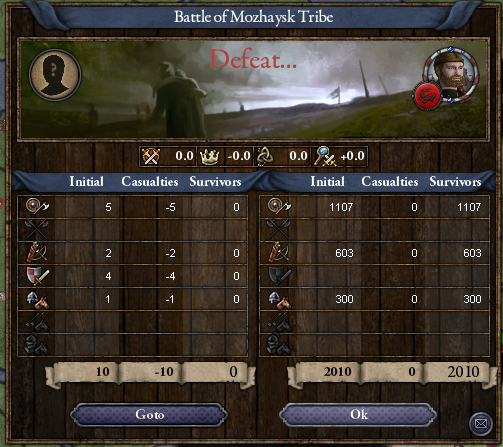 Rodislav first focuses on the Mordvin rebels, since they are by far the largest organized force facing the realm. He manages to scare them out of Mozhaysk due to the largeness of his army spreads to them; they retreat towards their allies within Iliya's alliance, but the Ilmenian army finally pins them down at Moskva. Though it costs the life of one of his commanders, the rebels are beaten that day, bringing an end to their bid for independence.   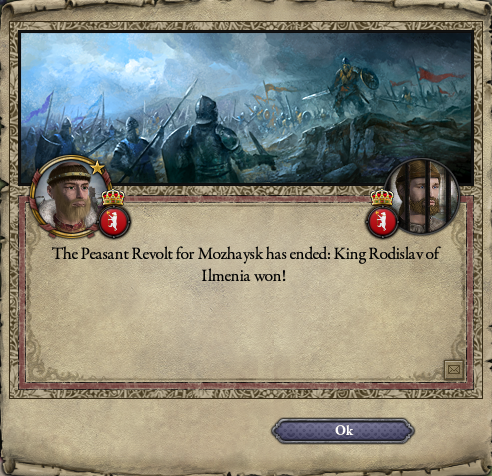 Kostroma is retaken in November and Rodislav is finally ready turns his attention towards his cousin, but while he was busy defending the farthest borders of the tribe, his chiefs have rallied to the flag of the High Chief of Courland and attacked Iliya directly, liberating Saaremaa for Ilmenia. While Iliya's allies are still more than happy to continue fighting, Ilyia isn't; hoping to not be immediately killed by Rodislav, he surrenders in late November. Rodislav is pleased that his cousin has finally seen sense and simply banishes him to live among the heathens and heretics he called allies not too long ago.  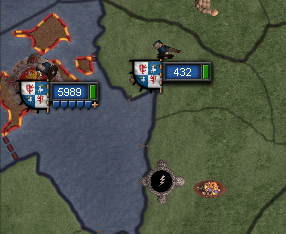 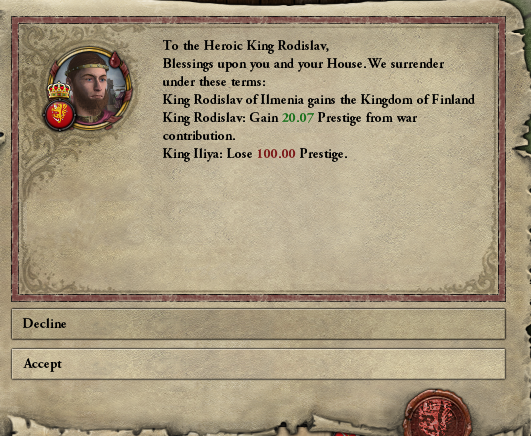 With the only pretender to his rule defeated, Rodislav sends his warriors home, despite the braying of the veche, who want to see him march next to Germany to defeat the Franks. Rodislav insist that his men deserve a rest to gather their strength; he is also quick to point out that military matters are the exclusive purview and that the veche should stay out of his business and that, in return, he will stay out of theirs. It isn't until July of 929 that he finally sends out word for his men to join him in Novgorod; once all his warriors are there they march to Poland, hoping to link up with the Polish, but they are intercepted at Poznan by a Catholic army and soundly defeated. The Ilmenians retreat back towards their homeland and Rodislav once again has them stand down, having kept his promise to the veche. The veche is less than happy with this turn of events. 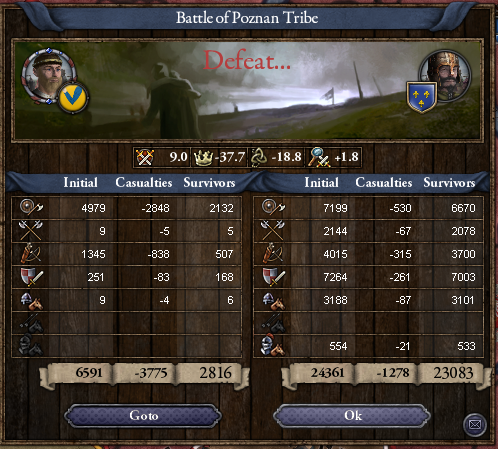 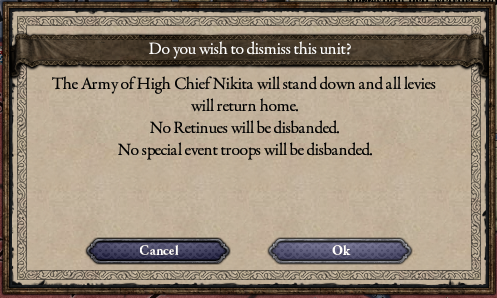 In retaliation, the veche creates the title of High Chief of Vladimir and hands it off to a Mordvin child named Kalju not related to the Slovenskys.   While Rodislav and the veche squabble, the merchants of Novgorod continue to perfect their craft, as they start to borrow design ideas from the Vikings that were observed in the Finnish Wars. They also invest in the continued build up of Novgorod's shipyards.  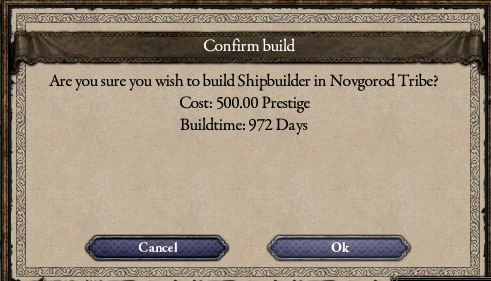 With the Great Holy War for Germany going so terrible, the Pope decides that the Catholics must go on the offensive and liberate Bavaria from the Slavs, which is divided between Great Moravia and Pomerania. It's beginning to look like the Slavic faith will never expand beyond its traditional homelands.  In February 931 a small, more radical minded group of priests from the Khram Yarilo approaches the veche to ask for funding to create a school for notable scholars from around Ilmenia; unlike the Khram Yarilo, which focuses solely on Jarilo and his worship, this new scholar's school would allow for anyone to join, as long as they sought to contribute to the overall body of knowledge in Ilmenia. The veche can see the value of having a dedicated set of scholars in the capital and approve funding the enterprise. 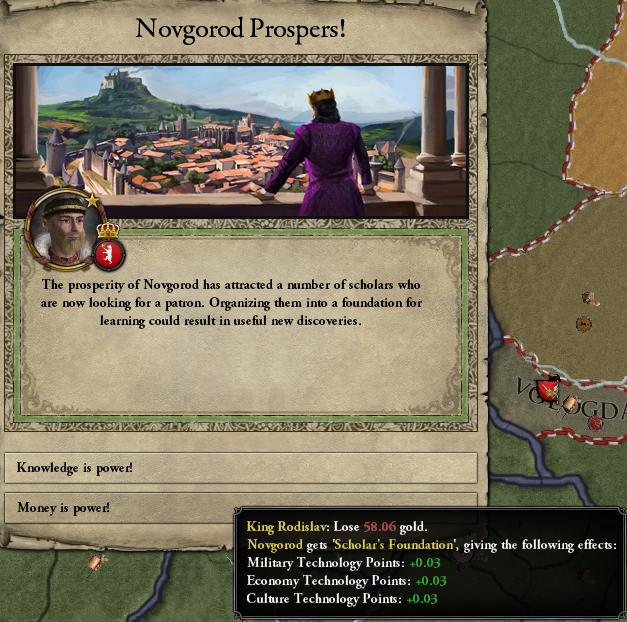 Women in Ilmenia have always had a bit of influence in the veche, starting during Rodislav II Dobro's reign when he appointed a woman to the veche, to when Ruslan invited women accused of witchcraft to join him in his court; women also hold power in the Slavic church, being able to become priests and diviners, as well as having the potential to be chosen as High Priest of the church. So its not completely surprising that in May the veche moves to codify the position of women in Ilmenia, hoping to nail down exactly what positions of power women can actually hold. While the law that's finally enacted is still fairly limiting, it does create a legal basis for women to cite in the future.   May 931 also brings some bad news: the Great Holy War for Germany is declared a failure; the Polish and their pet high priest point to Ilmenia and Rodislav as the reason the war failed, claiming that the Ilmenians could've sent more support to support their Slavic brothers. For his part, Rodislav claims that he saw no point in wasting Ilmenian lives for what was essentially a Polish war. While the veche agrees with the Poles in private, publicly they throw their support behind Rodislav, as the warriors and citizens of Ilmenia throw their support behind Rodislav's narrative. 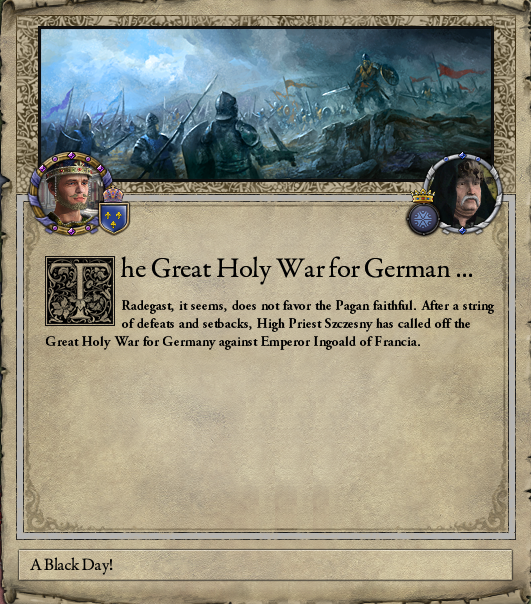 In June, the High Chief of Kola approaches Rodislav, demanding that he pay back a favor owed and claim the Norwegian city of Kemi for him. Rodislav, remembering the glory and prestige won by his grandfather during his wars against the Norse, agrees; the veche isn't consulted for any of this and when word arrives of Rodislav's actions, the veche loudly condemns it, though they take no other action. 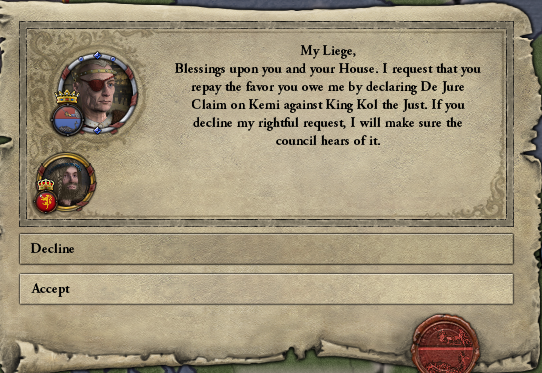 The Norwegians, caught up in a war in Alban, are slow to respond and before they can even properly muster an army, the ships of Ilmenia are off the shore of Kemi unloading their troops; Kemi falls on the new year without a single battle fought. 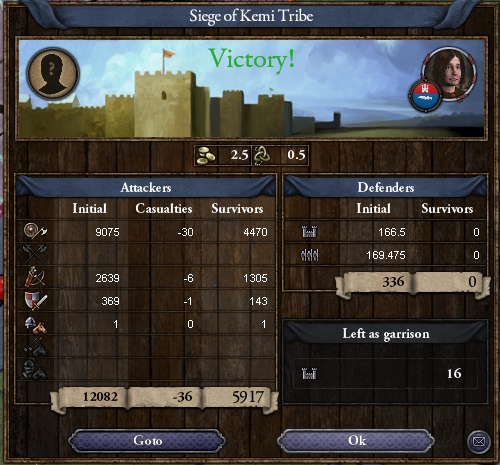 The Ilmenian army moves back into Ilmenian Finland and Rodislav sends diplomats to the Norwegian king, hoping that the man will see reason and accept the loss of a small, relatively worthless city. Instead, the Norwegians respond by rushing to Kemi; the Norse barbarians quickly over run the city, killing Chief Fedot, the garrison commander Rodislav left behind to defend the city.   Enraged, Rodislav returns to Kemi and takes the city; upon entering the city, all remaining members of the Norse garrison are brutally killed, even the ones that offer their surrender. The troops under his command begin to whisper that he is the chosen of Chernobog, though they make sure that Rodislav doesn't hear.  This time, Rodislav doesn't make the mistake of assuming the Norwegians will be reasonable and follows up his seizing of Kemi with an invasion of Norway proper; Vesterbotn falls without a single Norwegian survival, as Rodislav's wrath knows no bounds. He follows up the taking of Vesterbotn by forcing the Lappish tribes under Norwegian control to bow to him; those that don't find themselves quickly without a head. 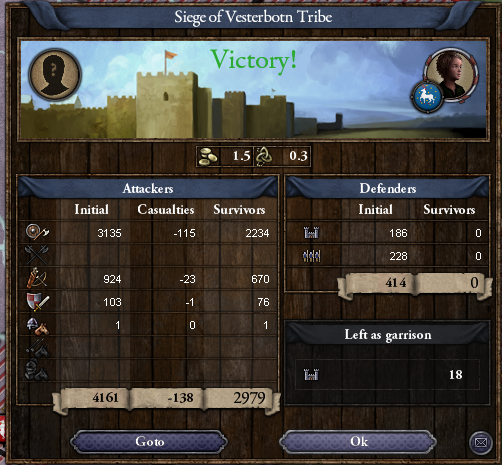 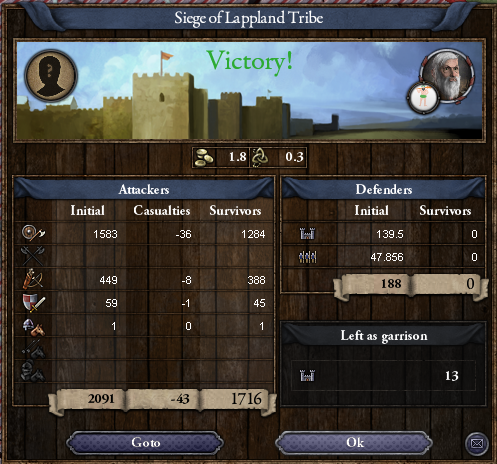 King Kol of Norway finally arrives from Alban in September 933, ready to take on Rodislav, who both the Ilmenians and Norse have begun to refer to as the son of Chernobog; unfazed by his reputation for bloodthirstiness, King Kol is sure that he will best this insane Ilmenian. He lands his troops at Kemi, fully intending to take the city back, but Rodislav isn't far behind, using the Ilmenian ships under his command to quickly land in Kemi, forcing a battle. King Kol finds himself outnumbered nearly two-to-one and the Ilmenians easily win the day.  Rodislav also discovers that one of his commanders, a man by the name of Trifon, is an outspoken opponent of the Perunians; Rodislav approaches him in the dead of night shortly after and invites him to join the Voiny Yarilo, explaining how he hopes to bring Ilmenia back to the light of Jarilo. Trifon, perhaps afraid of disappointing Rodislav, joins.   In September, the Archpriest of Ryazan, a man by the name of Iziaslav, demands that Rodislav step down from the office of tysyatsky and that the veche appoint his cousin Demid to the office. Unsurprisingly, Rodislav declines and Archpriest Iziaslav rises up in revolt, bringing with him the Chief of the Nenets, who is extremely unhappy with his lower status in Ilmenia's hierarchy. 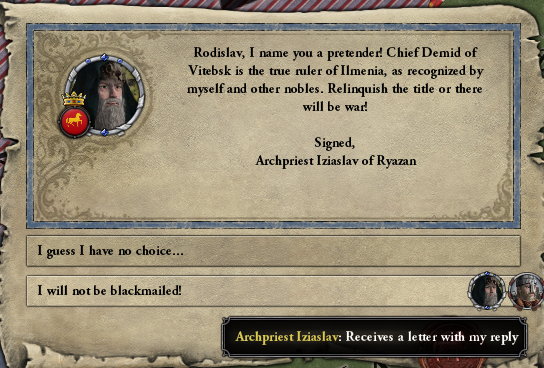  A small army of peasants rise up in Murom in January 934, but instead of fighting against Rodislav, they rise up in order to aid him; they even manage to defeat a small rebel army trying to take their city.  Rodislav decides that pressing a distant cousin's claim on the unimportant city of Kemi isn't as important as holding on to his realm and office, and so, after months of negotiations, an unsatisfying peace is struck between Norway and Ilmenia, satisfying no one. 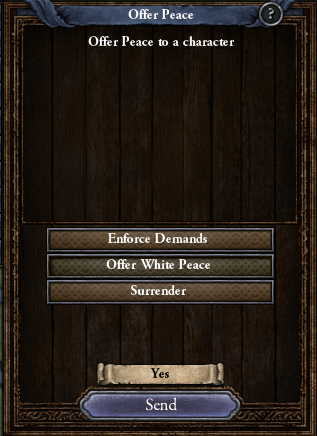 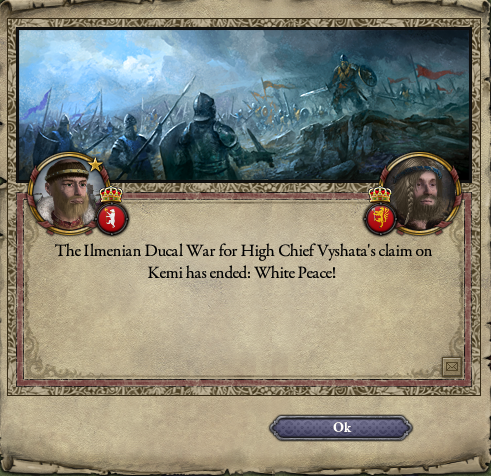 While Rodislav was negotiating peace, Chief Num of the Nenets takes Zaozerye in August of 934. This doesn't last long, though, as Rodislav quickly loads his army into transport ships and quickly redeploys to Ladoga, before marching on Chief Num. In October, the two armies clash and, despite the fact the loyalist army is extremely tired from the war for Kemi and barely reinforced to full strength, they easily beat the pretenders; they even manage to capture Chief Num, striking a major blow against Archpriest Iziaslav and the rebel army.  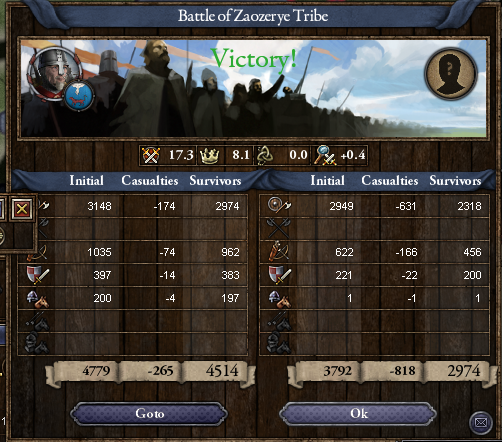 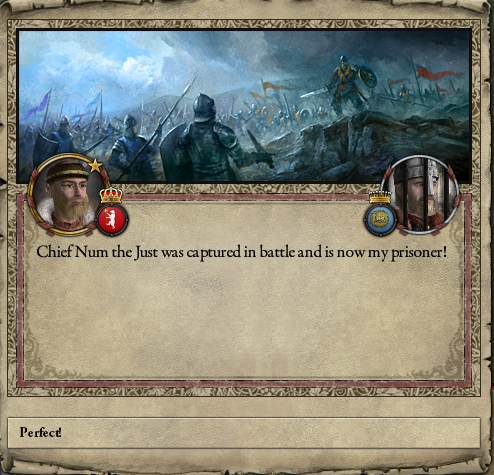 Zaozerye falls shortly after and soon Rodislav is marching on Bjarmia, taking towns and cities as he goes; he even manages to best the pretender army again at Pomorye and it begins to look like Archpriest Iziaslav's war will be over within the year. 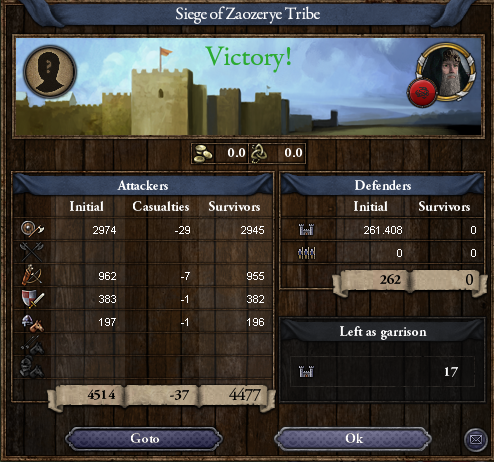   That is, until the chiefs of Finland demand that Rodislav leave the office of tysyatsky in favor of his brother Demid; Rodislav refuses and, in March of 935, they declare a war for Demid's claim to tysyatsky. Now Rodislav finds himself fighting two wars to put a pretender named Demid into the office of tysyatsky. 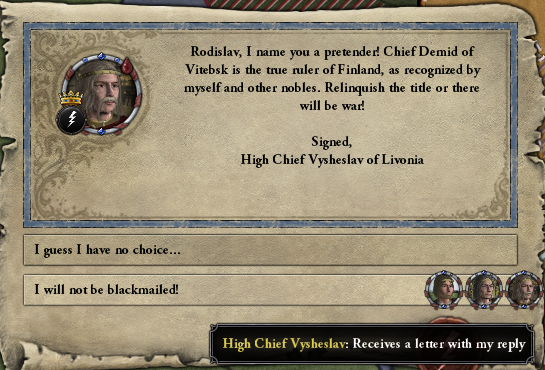  Rodislav is facing enemies all around, each claiming his duly elected office, with a veche that doesn't particularly like him; it remains to be seen if he will be able secure Ilmenia for himself or if it will fall into squabbling and infighting.
|
|
|
|
Annnd that's what you get for being a filthy heretic, Rodislav, get overthrown
|
|
|
|
Are you going to mod this to introduce a legitimate Jarillo heresy?
|
|
|
|
Sampatrick posted:Are you going to mod this to introduce a legitimate Jarillo heresy? Well I did it and discovered something rather annoying/funny: any heresies of reformed pagans will be unable to force convert others in your court or declare holy wars, even if they are organized religions. I think I've found a work around, but I make no promises! THE LESBIATHAN fucked around with this message at 04:49 on Dec 4, 2017 |
|
|
|
Here's hoping it doesn't make the game explode.
|
|
|
|
Chapter 26: Res Publica Faced on all sides by enemies, Rodislav offers Archpriest Iziaslav and his compatriots a white peace, promising that they will not be tried as traitors should they accept. Iziaslav, sensing that his war was lost, agrees and travels to meet Rodislav and his army to personally submit. Rodislav graciously accepts his surrender, and then immediately imprisons Iziaslav and sends him back to Novgorod to await his judgement. 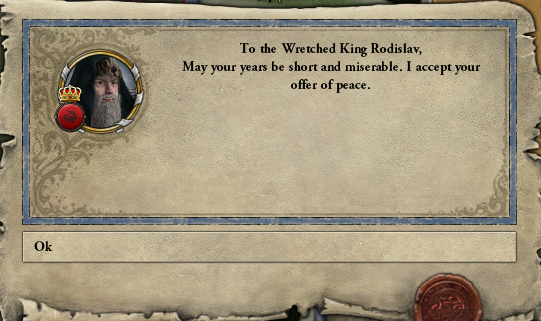  Despite his decisive action in dealing with Iziaslav's rebellion, the rebels under Vysheslav manage to take the island of Saaremaa, further cementing their control over Livonia.   Word also arrives from far off Lombardy, where the Lombard king, with the consent of the Pope, has created a holy order similar to the Warriors of Perun; this holy warrior is mostly composed of Bavarians fleeing from the combined armies of Great Moravia and Pomerania, who have conquered the area several years ago, though a few Lombards do join in order to find glory in the name of their god.  Rodislav begins his march to confront Vysheslav, but before his army even engages the enemy, they're already fighting; two of his commanders get into a brawl over a game of dice. Rodislav breaks them up without too much damage on either side, but the troops under each commander involved in the fight become actively hostile to each other.  With the constant wars since Rodislav assumed the office of tysyatsky, Ilmenia is once again in debt; to help relieve some of this debt, the veche approaches the high chief of Belo Ozero to ask for a small loan. High Chief Vladimir does the veche one better and offers to fully support the realm for several years from his own coffers, but in return he expects to be given a seat on the Novgorodian veche; the veche agrees, marking the first time a chief would sit on the veche, instead of representatives appointed by him.    The Ilmenian army finally engages the rebels at Zemlia and handily defeat them; Rodislav pursues them as they retreat towards Saaremaa and, while he doesn't manage to engage them before they retreat into the the island's cities to defend themselves, when his army finally does take the island back he is able to easily round up and kill everyone that dared to rebel against him. 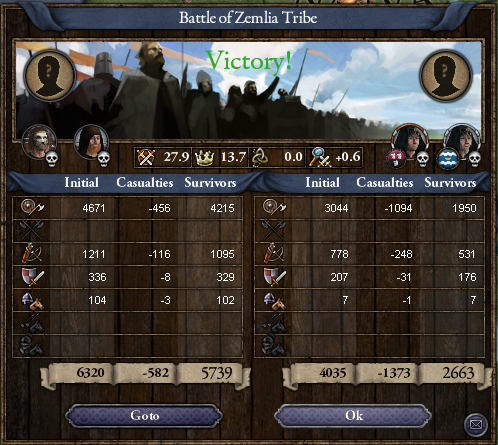  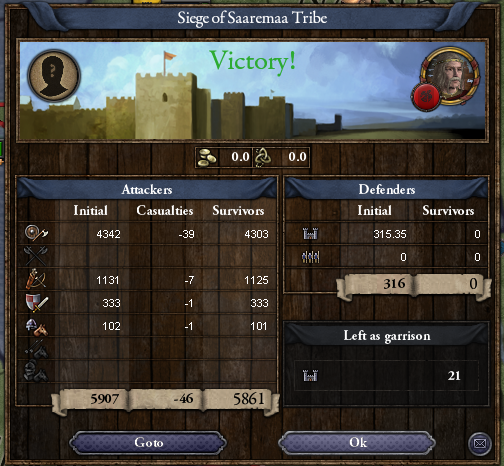 Vysheslav manages to find a few men who aren't completely cowed by Rodislav's reputation for cruelty and assembles them in Livonia to try and beat back the loyalist army preparing to assault the area. Rodislav decides not to give him the chance to mount even a small defense and, in May, the Ilmenian army lands near Liivimaa and engages the still gathering rebel army. Vysheslav is taken completely by surprise and in the following battle, he is knocked off his horse and hits his head and, while he appears to be alert and able to conduct the retreat of his forces in good order, the next morning he doesn't wake up, having slipped into a coma; he doesn't last much longer after that and when he dies his son takes up the banner of rebellion. Unfortunately for Vysheslav's young son, without his father's charisma and keen strategic mind, the rebellion quickly falls apart and by the time Rodislav's army has taken Liivimaa, the rebellion is over.  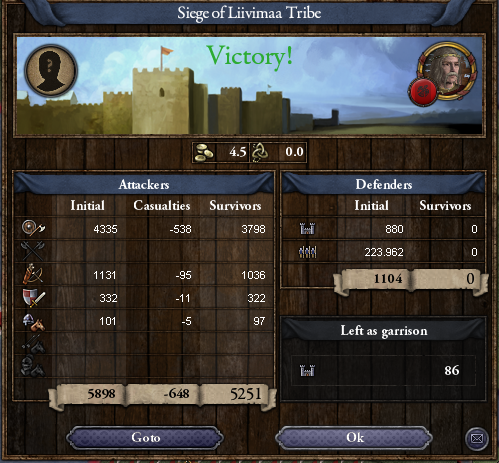 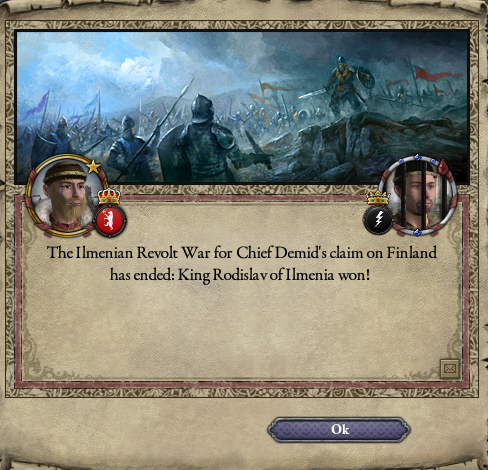 Rodislav returns to Novgorod and immediately offers his thanks to Perun for his victory against his foes in the form of sacrificing one of the numerous rebels littering his dungeon. Then he calls a Jarilo festival and invites his few remaining free vassals to join him in Novgorod to celebrate the patron god of Ilmenia; the message he wishes to send to his vassals isn't very subtle.    Still, Rodislav wants to make his message extremely clear to his assembled vassals and, after the traditional naming of a representative of Jarilo and then parading him around the city, Rodislav and his vassals adjourn to his castle where before the feast in honor of Jarilo begins, he has the remaining rebels paraded in front of the assembled chiefs, in a gross mockery of the sacred celebration they'd just taken part in. After giving a short speech about the value of loyalty he personally executes the rebels, much to the shock of the chiefs; Rodislav has completely ruined this most sacred of festivals, doing a great dishonor to Jarilo. The nickname Rodislav picked up during his campaigns in Finland resurfaces: Rodislav, Son of Chernobog.    Rodislav also uses the Jarilo festival to announce that he has named himself the High Chief of the Nenets, basically stealing any power that the Nenet chiefs of Bjarmia claimed; he also does this without consulting the veche, managing to anger not only his high chiefs over his breach of power, but also the increasingly powerful veche.  The veche and the chiefs have had enough of Rodislav's blatant abuse of power and while they are all gathered in Novgorod, they plan to drastically limit his power; on the last day of the Jarilo festival, the assembled chiefs manage to get Rodislav extremely drunk and when he finally wakes up he's in the dungeon below his castle, surrounded by important veche members and chiefs; once he's fully awake, they quietly explain that he will bacl a set of sweeping laws that will empower and expand the veche, while severely limiting his own powers. Rodislav is initially resistant, but once they also explain that he'll meet an untimely end and that they've already picked his successor, he begrudgingly agrees. The new laws open up the veche to the chiefs, finally giving them a say in the affairs of Ilmenia beyond their traditional role as advisers to the tysyatsky. The veche also makes sure to fully detail what the tysyatsky can do wihtout their approval; unsurprisingly, it is mostly limited to leading troops and acting as the face for the veche to negotiate peace deals. But perhaps the biggest change is that the position of tysyatsky is opened up anyone of "good standing and character," bringing an end to Slovensky dominance of the office and the rise of importance of the merchant houses that dominate the city, as well as the chiefs who've made their fortune by trading.   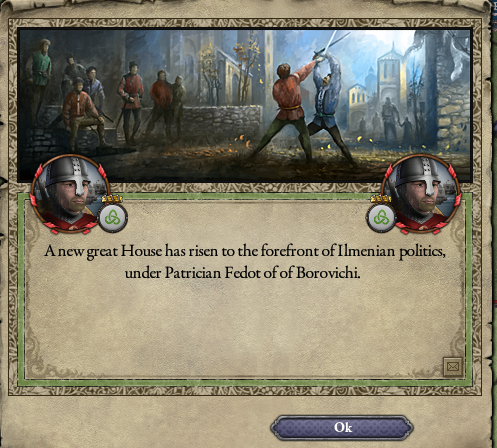 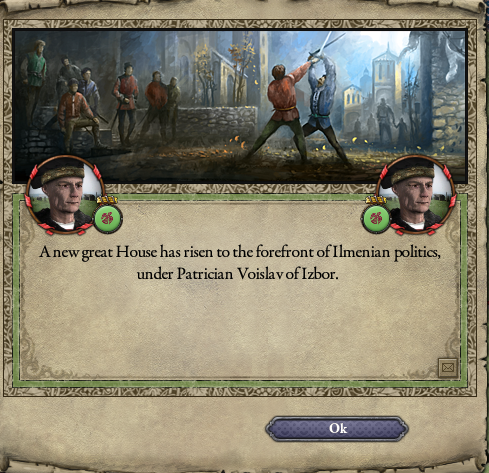 The veche's first act is to demand that Rodislav declare the son of the traitor Num the High Chief of all Nenets; bolstered by the support of the newly empowered chiefs and merchants, Rodislav agrees, as he's not incredibly eager to fight a civil war he's sure to lose. 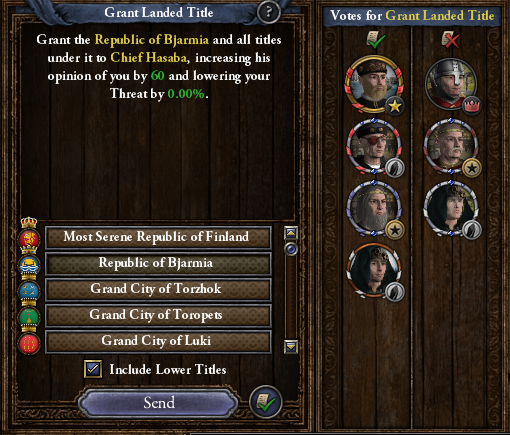 Rodislav decides to bid his time and build up his support in the only place he still has any amount of autonomy in: the military. He starts by scouting out promising soldiers who, by the unfortunate luck of their birth, have no chance of rising beyond their lowly position. By chance, Rodislav notices a young man named Briachislav who's skill with a blade and understanding of tactics far out strips the commanders appointed by the veche; Rodislav quickly introduces himself to Briachislav and offers to give him patronage to help him rise beyond being a simple soldier. Briachislav is only too happy to accept and soon the two can be seen discussing military matters; of course Rodislav doesn't help the man out of a misplaced sense of kindness or a wish to make his army a more equal place, but instead with the goal of raising Briachislav to the veche, where Rodislav can use him to influence the veche. 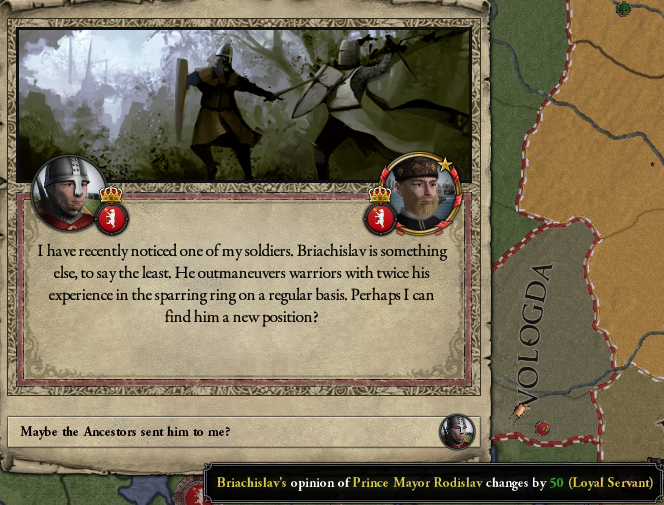 While Rodislav attempts to play politics, the rest of the Slovenskys, lead by Rodislav's son Dobrynia, decide to play a different game: the Slovenskys were bested by canny politics and a lack of friends in the veche and Dobrynia decides never to allow the family to be brought so low again; he knows that the best way to win friends and influence politics isn't with a kind word or a stout heart, but with cold hard cash. In 937 he quietly buys up independent merchants with what little money the family has, as well as abandoned warehouses and old ships, until, finally, the Slovenskys have a profitable little trading company, which, when combined with the family's contacts in Alban and the Byzantine Empire, creates a quickly growing trading enterprise. By 938, the Slovenskys' little trading venture dominates Novgorod, giving them an incredible amount of say within the city. With Novgorod's trade secured, Dobrynia looks to expand Slovensky control outside of the city; to this end, he starts bribing the merchants of neighboring Toropets and Luki to work with the Slovensky family exclusively. 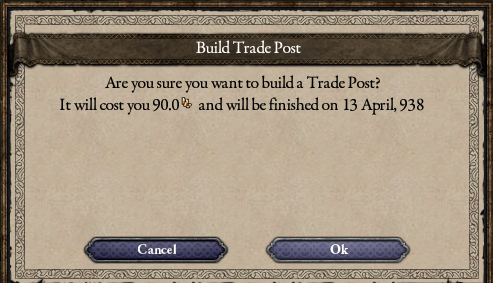 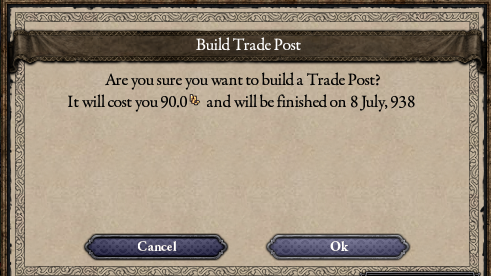  Dobrynia's cutthroat strategies being to pay off, and even Rodislav is forced to acknowledge his son's abilities when Dobrynia is able to make one of the rich vassals of the caliph pay for the rights to trade in Novgorod. Its starting to look like the best way to advance in this strange and new government is not with merit or force of arms, but with gold.   In November, the Slovensky ships of Novgorod begin trading in something much more nefarious: blackmail. Apparently, a young noble has had a child with one of the Dukhovsky family's youngest female members; to make matters worse, the young woman is married to the son of an important business contact and, while the young lad and his family are none the wiser, the Dukhovskys are and they'll do anything to cover it up. Rodislav accepts the man's money to ship him off to small Albani town, but he makes it his personal business to make sure that he knows about the status of the young noble; after all, he never knows when he'll need the Dukhovskys to back him in the veche.  As 937 turns to 938 and then into 939, Rodislav, with a large amount of help from Dobrynia, finally starts to get a grip of what exactly he'll have to do to keep the Slovensky family relevant in this new Ilmenia; using the money gained from their trading business, Rodislav continues to consolidate his family's control over the merchants of Novgorod, this time by building new and exclusive docks just for merchants that are affiliated with the Slovenskys. Even though these docks are only for Slovensky merchants, they do bring new trade to the city, greatly increasing the amount of taxes that can be collected by the veche.  One of Rodislav's nephews asks him for his permission to join the Warriors of Perun; Rodislav can hardly believe that one of his own kin would be a Perunian and he is quick to set the boy straight, though his nephew doesn't seem to appreciate it, for some reason. 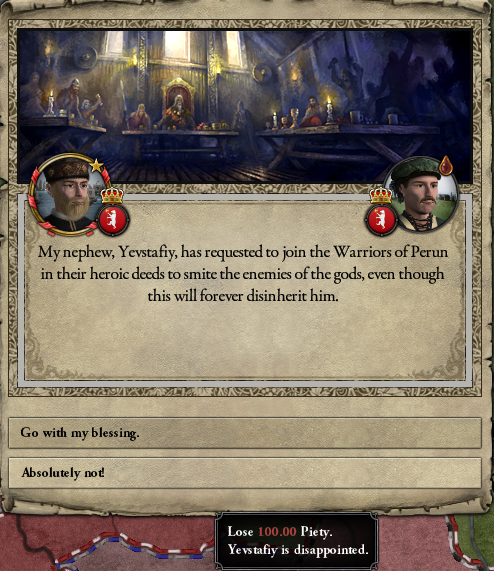 Rodislav also puts his family's new wealth to good use by buying friends; he helps one of his outspoken critics, Chief Triton, rebuild some of his fortifications, using some of the Greek trained architects of Novgorod to do so. Chief Triton is extremely grateful for Rodislav's willingness to help even his biggest critics and not long after Chief Triton's criticism becomes less and less vocal and Rodislav and Chief Triton become friends.  Of course, sometimes the subtle and delicate touch isn't always available; Rodislav is always more than happy to shake up the veche in any way that he can and, in November, he takes a play from Rodislav II Dobro's book and appoints a woman as one of his representatives on the veche, easily circumventing the recent law about the positions women can hold on the veche. The veche is in an uproar, but can find no legal reason to disallow it, and so Pereyaslava stays.  Novgorod also sees another influx of Greeks, fleeing from yet another civil war in the Byzantine Empire, but unlike the first wave of Greek refuges, these Greeks are much more numerous and bring with them not just their religion, but also priests and minor nobles who were ousted in the civil war. The priests of Khram Yarilo and the nobles of Novgorod push back against these new Greeks, fearful that they'll replace them; Rodislav only sees a chance to shift the veche in his favor, as the new citizens will eventually send their own representatives to the veche once they've settled in. And so, the Greeks settle in Novgorod.  Rodislav continues to confound the veche by appointing women to represent him in the veche, this time appointing a woman named Dobrava as his spymaster, giving her full rights to sit on and vote in the veche.  940 brings great news from, of all places, Bavaria; despite the creation of the Teutonic Order, the crusade for Bavaria has failed. At first, Rodislav assumes its because of the brave fighting of Moravian and Bohemian troops, but as further news from Western Europe continues to trickle east, Rodislav is shocked at what he learns.  The Waryengian Guard, foederati of the Western Roman Emperor, have killed him and the royal family, leaving no Carolingian alive, before appointing their leader, a Lombard by the name of Unichis Daufingi, as the new Western Roman Emperor. The new Norse emperor's first action was to expel the Pope's representatives from Île-de-France, before ceasing all imperial involvement with the First Crusade; suddenly with only the backing of Lombardy, the tides turned against the Catholics until the Pope had to admit defeat.  Sic transit gloria mundi. THE LESBIATHAN fucked around with this message at 01:02 on Dec 6, 2017 |
|
|
|
I had nothing to do with this, besides copying the Varangian Guard events and reworking them to be for Francia. I... uh, well I'm not fully sure what happened, but the Karlings are dead, so I'm fairly fine with that.
|
|
|
|
How stable is this brave, new Francia?
|
|
|
|
mcclay posted:How stable is this brave, new Francia? Currently fighting a massive civil war against most of their Catholic king level vassals.
|
|
|
|
What is it with random germanic pagans suddenly seizing the very centres of western christendom one after another?
|
|
|
|
I think the first "woman appointed to the council" screenshots is in error.
|
|
|
|
GunnerJ posted:I think the first "woman appointed to the council" screenshots is in error. Fixed, thank you!
|
|
|
|
Haha what the gently caress is up with random religions accidentally taking over major world powers in recent LP's?
|
|
|
|
I think it stands to reason that if we have Orthodox-inspired Slavic paganism, the reformed Norse have to be inspired by Carolignian catholicism. Also please just let the Franco-Norse empire get reformed if it survives a generation.
|
|
|
|
All Unichis knows is he got super drunk one evening after his watch shift, blacked out, and woke up on a throne, dressed in bloodied finery and being hailed Imperator by hundreds of guards brandishing servered body parts on pikes.
|
|
|
Rodyle posted:All Unichis knows is he got super drunk one evening after his watch shift, blacked out, and woke up on a throne, dressed in bloodied finery and being hailed Imperator by hundreds of guards brandishing servered body parts on pikes. or as I like to call it, Saturday night
|
|
|
|
|
Crazycryodude posted:Haha what the gently caress is up with random religions accidentally taking over major world powers in recent LP's? The DLC that added secret cults and expanded some religions made religions really unstable. It was worse for a while but it has been toned down some with patches.
|
|
|
|
Sinner Sandwich posted:I think it stands to reason that if we have Orthodox-inspired Slavic paganism, the reformed Norse have to be inspired by Carolignian catholicism. The only way to do that would through lots of save game fuckery, which I am unwilling to do.
|
|
|
|
Crazycryodude posted:Haha what the gently caress is up with random religions accidentally taking over major world powers in recent LP's? Adventurers I would imagine. I seem to recall them being a huge pain in the rear end even for a player controlled country.
|
|
|
|
Chapter 27: Son of Chernobog The Western Roman Empire has fallen under the sway of the heathen Norse and, while Rodislav is sure that it'll have no effect on Ilmenia due to the distance, but something particular happens in late 940 and continues through all of 941: Frankish priests fleeing Unichis as he cuts his way through the church's hierarchy in the Western Roman Empire have made their way to Alban, but there is a not completely unreasonable fear that the Waryengian emperor will invade the island. Most of these Franks find their way to Ilmenia via Albani and Ilmenian merchant ships, enticed by tales of Novgorodian Greek merchants that describe the city as a safe haven for those that have nowhere else to go. Soon, the docks of Novgorod are filled with the sound of Latin colored by Frankish, as more and more priests arrive in the city. Most choose to make their way to the Byzantine Empire and then from there to Italy, but a few settle in the city, bringing with them stories of the Roman Empire, as well as the Catholic Bible. The strict religious tolerance of the city encourages the priests of the city's three religions to meet and debate and soon a mixed group of priests approaches the veche with the idea of building a great library in the city, where the three religions can meet and discuss great ideas of both theological and philosophical nature. The veche sees value and, in 941, the proposal is approved and construction starts; because of the nature of the library, it ends up having not one, but three names: the Orthodox of the city call it the Library of St. Alypius the Stylite, the Catholics call it the Library of St. Jerome, and the followers of the Slavic church call it Gamayun's Library. Over time, it simply becomes the Library of Novgorod. 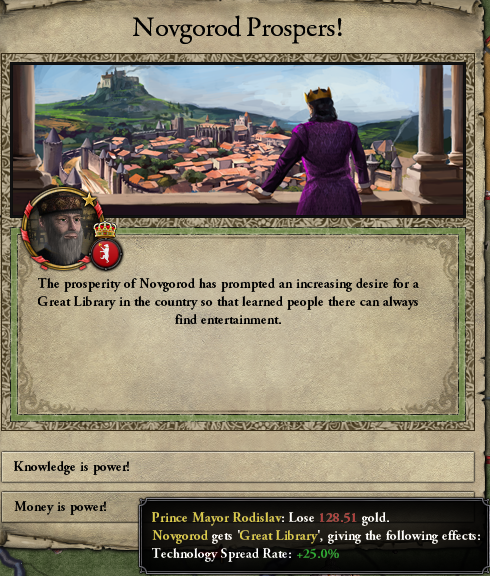 Rodislav continues the policy his father started long ago and marries one of his relatives to the new Polish king, but instead of angling for an alliance for Ilmenia, he's working to create an alliance between the Slovenskys and the Polish kings, hoping to give himself some leverage when it comes to dealing with the veche. 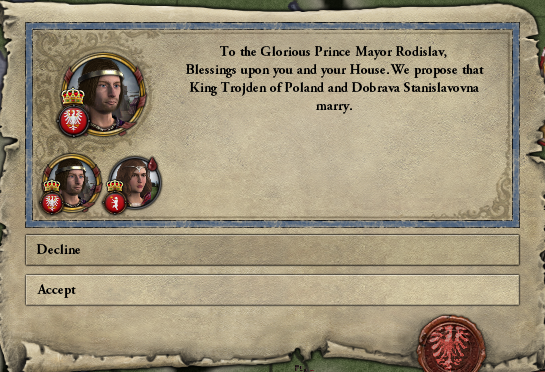 The last scion of the House of Dukhovsky dies out in 942 and Rodislav calls back his man in Alban keeping an eye on the noble who sired a child with one of the Dukhovsky women. While he is sad to see his blackmail disappear, the gold he gained from the endeavor more than makes up the loss of whatever political power it would've gained him. With the Dukhovskys gone, their assets are quickly sold off; the biggest winner from all of this is House Lukisky, who acquire most of the defunct Dukhovsky ships and warehouses, which in turn increases the amount of say they have in the veche.  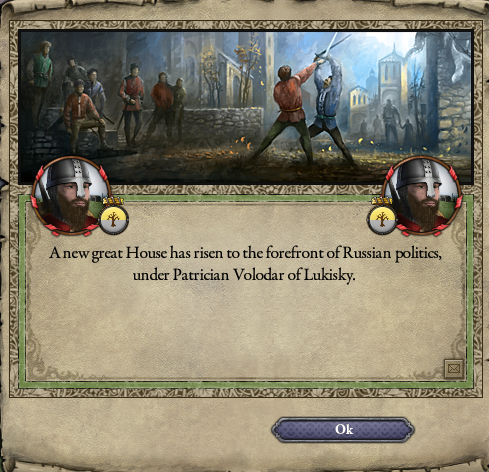 In March, the veche continues its efforts to ease their administration of Ilmenia from Novgorod by creating the High Chiefdom of Jemotskaia Zemlia, which is handed off to Chief Volodar of Zemlia; the new high chiefdom includes the rather important port of Memel, which also happens to be a stronghold of Romuva nobles and priests. Traditionally, Memel and its neighbor Zemlia have been strong supporters of the Slovensky family and that by appointing Volodar, a non-Slovensky, as its high chief the veche will be able to sap some of Rodislav's clout. 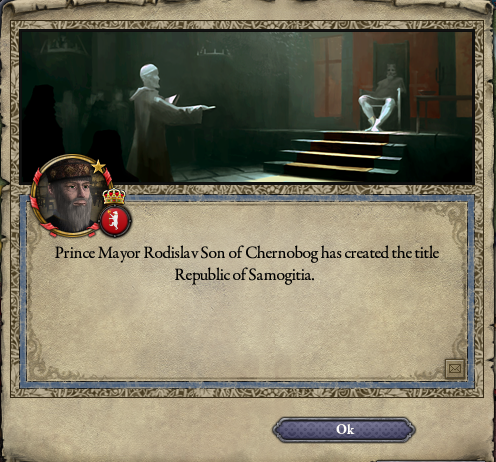 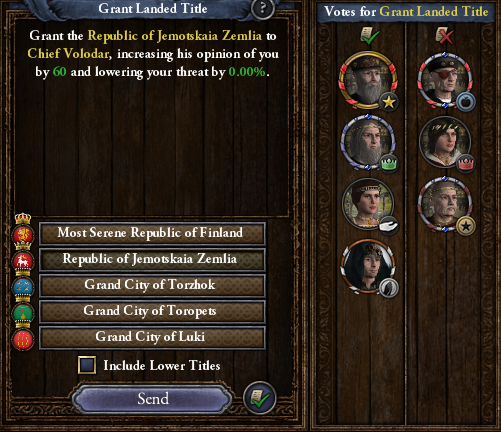 In 942, the church increases the yearly tithe at the request of the Polish king; the tithe blatantly goes directly to the king to fund one of his many wars to try and reclaim Moravia. Rodislav, ever critical of the church, holds a public speech at the steps of the Dom Veche decrying that Ilmenian gold would go to fight a foreign war that the people have no stake in; surprisingly, his speech strikes true for many people, particularly the nobles and merchants of the city, who the new tithe has hit particularly hard. Rodislav advises that the tithe be ignored until the Polish king's war is over, before promising that he'll refuse any order by the veche to forcibly collect the tithe.  With the influx of Frankish priests, Catholicism is on the rise once again in Ilmenia, as Chief Svetozar of Latgale has converted to the teachings of the Pope in Rome; while Rodislav can't stand the Polish church, he can at least admit that, in their own twisted way, they're Slavic. Chief Svetozar, however, has forsaken the ways of the Slavic faith and, to make matters worse, he claims kinship to Rodislav and the Slovensky family; he demands that the veche revoke Svetozar's title and lands and the veche, for once, agrees, not eager to see their grasp over the common man slip away. When the demand Svetozar convert back to the Slavic faith or forfeit his lands, Svetozar chooses war instead, hoping that the Catholics of Ilmenia will flock to his banner. They do not.   Svetozar's rebellion goes about as expected, as the Catholic force is completely crushed by the significantly larger Ilmenian army. The war is over by the start of October.  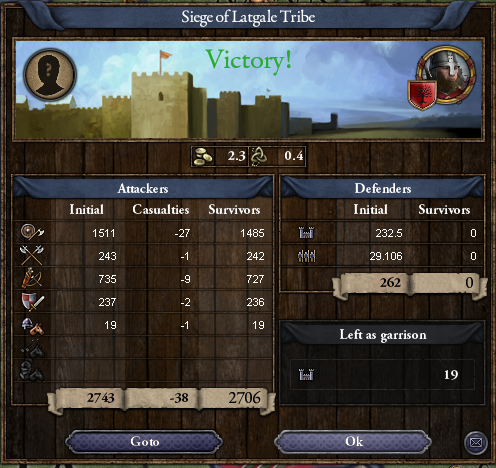 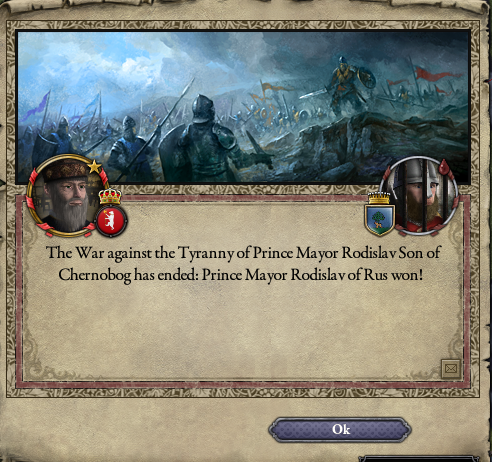 Immediately following his surrender, Svetozar is stripped of his titles by the veche, but instead of appointing a new chief for the city of Latgale, they instead create the High Chiefdom of Polotsk, with the hope that having a strong chief in the area will prevent others from converting to a false faith. The veche prepares to select one from its number to make the high chief of Polotsk, but Rodislav has other plans; he calls in his favors and, with the strategic use of bribes, manages to have the veche select his kinsman Chief Rogvolod of Polotsk as the newest high chief. 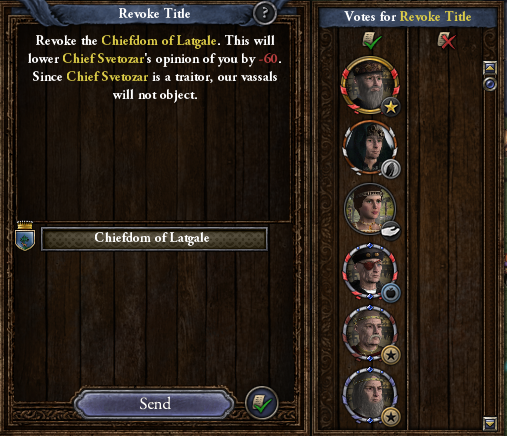 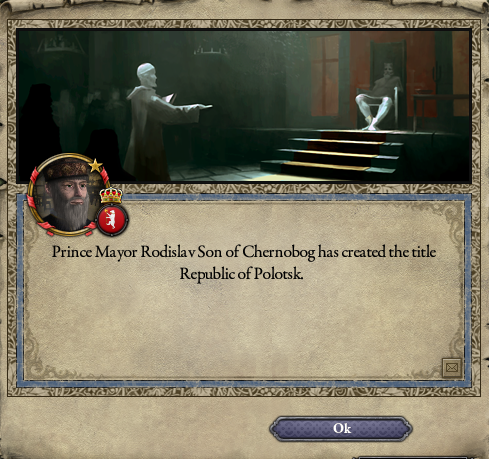  Peace returns to the young republic, and Rodislav, with the help of his son, goes back to managing the family's finances. The money starts to roll in, as the trade routes established by previous Slovenskys, as well as the hard work Dobrynia has put into the business, finally starts to pay off. Rodislav decides to invest this new wealth into renovating and expanding the family's traditional castle, with the intent of turning it into a truly magnificent mansion that will both communicate the wealth and prestige of the Slovenskys, while also providing a suitable base of operations for their trading empire.  Rodislav also continues to try and build a heresy that can take on the Perunians, though more and more often the "rituals" he creates involve drinking and partying. Its during one of these rituals, which takes place in the woods outside of Novgorod during the new moon, that Rodislav falls into the fire that he and his fellow Jarilic heretics are dancing around. His life is saved by his thirteen year old cousin, a boy by the name of Vyshata, the high chief Belo Ozero; Rodislav is in the boy's debt and immediately names him his chosen successor for the Voiny Yarilo.  In 945, the veche allocates funding for the creation of a small band of warriors, in the style of the Warriors of Perun, but without being loyal to the church; these druzhina are answerable to the tysyatsky and the veche and, unlike the levies that can be called upon by the tysyatsky during times of war, the druzhina are always on alert and ready to fight whenever the need arises. While they're small right now, they promise to be a vital resource for Ilmenia in times of war.  Rodislav begins to feel the pressure of not only running the Voiny Yarilo, but also managing the affairs of the Slovensky trading business and fighting for control in the veche and, as a result, his attention becomes increasingly divided among all three, and he becomes more and more stressed. The veche uses Rodislav's inattentiveness to conduct a minor purge of his supporters in the veche; the prime target for their ire is Dobrynia, Rodislav's son and commander, who stands accused of beating the daughter of a noble. Of course, the noble in question is an ardent supporter of the veche and, when Commander Dobrynia asks that the daughter take the witness stand, she is nowhere to be seen. By the time Rodislav finally catches wind of the whole plot, its already too late, as Dobrynia is expelled from the city. With his favored son exiled from Novgorod, Rodislav is forced to make his son Yefimiy his new heir. Rodislav's resentment of the veche grows. 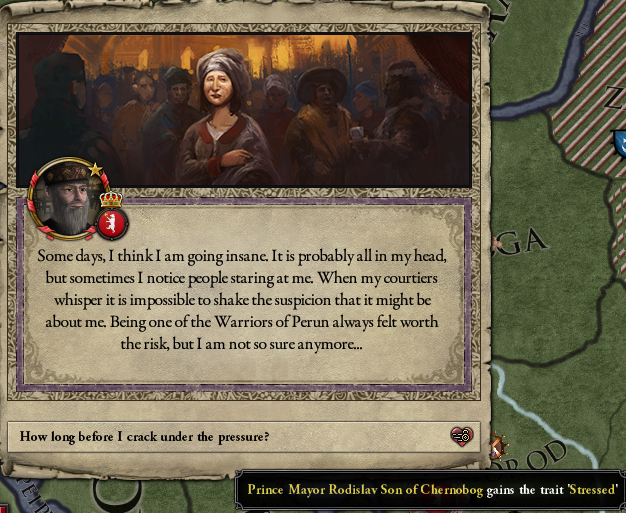 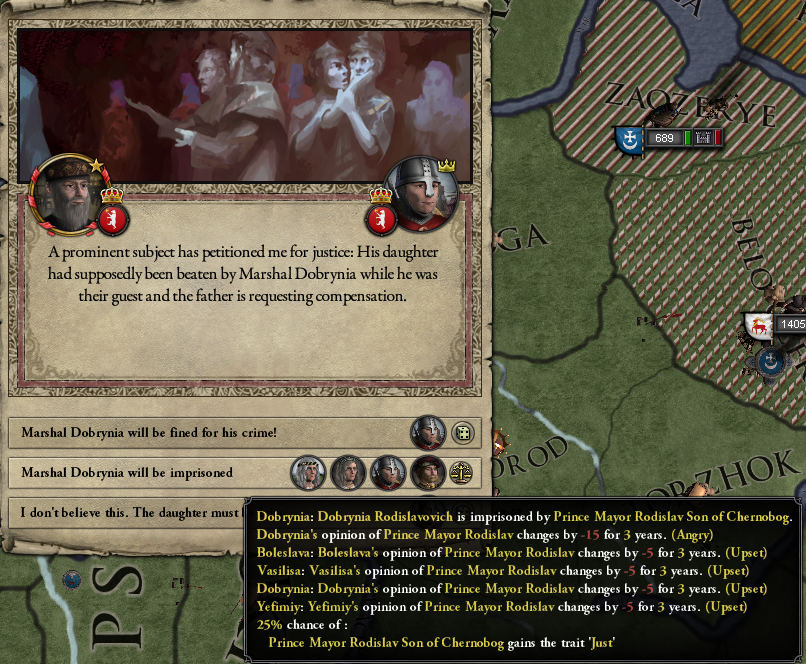 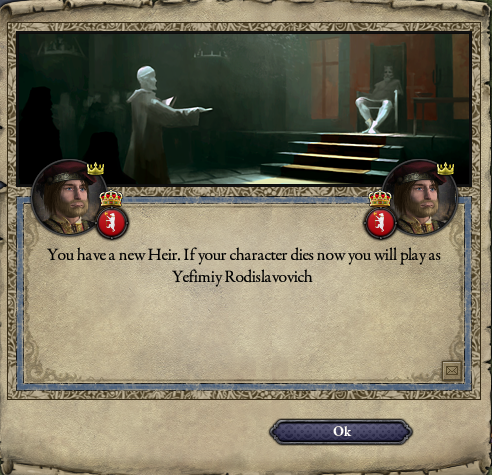 Rodislav begins going to the Khram Yarilo more and more frequently, as his role in the running of Ilmenia becomes smaller and smaller; his hope is that by tending to the sacred gardens, he'll hear the voice of Jarilo once again. Though he doesn't hear Jarilo, he does end up making friends with the temple's priests and other followers of Jarilo. 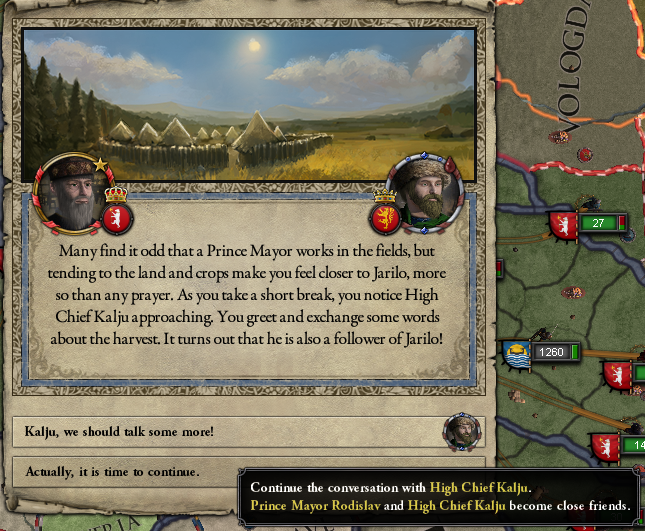 Rodislav returns to his duties refreshed and full of energy; his first order of business is to approach the veche to ask for a war against the Mordvin tribe of Vologda for the city of Chud; the city is an important stopping point for Ilmenian traders using the Volga River to trade with the nomads of the east and the Greeks in the Caucasus region, so the veche is only too happy to agree. War is declared in November, forcing the Ilmenians to wait until winter breaks before a full offensive can be planned and executed; Rodislav finally marches in June of 946 and arrive in Chud in mid-July. The Mordvins have no real army to their name and both of their major cities fall with relative easy.  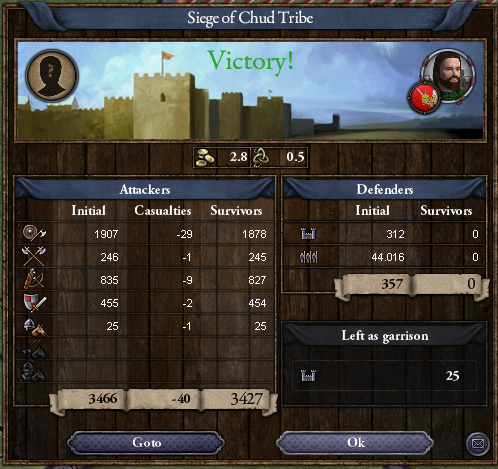  Chud is surrendered to Ilmenia and, when the veche approaches Rodislav about turning it over to a minor noble, he flatly refuses. The veche argues that this is against the laws as established by previous tysyatsky, but when he asks them to point him to the law where it says he must turn over all conquered lands to the veche, they can't. Satisfied with his minor victory over the veche, Rodislav decides to turn Chud into a city worth having, particularly because its importance as a stop along the Volga promises to pay off in the future.   With a victory under his belt and the veche steaming at his flagrant abuse of his position, Rodislav decides to once again try his hand at politics; to this end he hires a young and promising physician by the name of Nikita, who has angered a local noble by removing one of his daughter's eyes in an attempt to save the young woman's wife. The noble is outraged at Rodislav for giving patronage and publicly attacks him in a speech pointing out the tysyatsky's numerous flaws; Rodislav then sends out a huge mob of drunken sailors, who boo the man and attack his personal guard, throwing the city into disarray. When all is said and done, the noble is disgraced for causing a riot in the city, the veche is more than slightly afraid to criticize Rodislav, and the Slovenskys now employ a rather brilliant physician.  Novgorod also sees another boom in innovation, thanks in large to the Library of Novgorod allowing members of different faiths to meet and talk in an academic environment. Perhaps the most exciting innovation is the adaptation of Viking longboats for river travel, greatly increasing the city's merchants ability to trade.  One cold September morning, in 947, Rodislav is found hanging in his bedroom, apparently dead by his own hand, though rumors swirl around Novgorod that he was killed by an agent of the veche. His son and heir Yefimiy gathers his family's druzhina and rushes to the Dom Veche, hoping to "convince" the veche to support him as the next tysyatsky, but he is surprised to see the august body already assembled and preparing to appoint Volodar Lukisky, a member of the veche, as the new tysyatsky; to make matters worse, Volodar has brought his own druzhina, and Yefimiy is forced to watch the Iron Crown of Briachislav slip from the hands of his family for the first time in more than a hundred years.  History remembers Rodislav as Tysyatsky Rodislav Syn Chernoboga, often translated as Rodislav the Son of Chernobog.
|
|
|
|
more Lord Nerdgorod
|
|
|
|
More Merchant Slavs!
|
|
|
|
Time to see how these gents get out of this pickle.
|
|
|
|
Hype for the Norse refugees to start flooding in three updates from now when the WRE is usurped by a band of roving Manicheans
|
|
|
|
I thought Poland had converted to feudal government, but the king's ring had the brown tribal ribbon around it?
|
|
|
|

|
| # ? Apr 28, 2024 08:40 |
|
GunnerJ posted:I thought Poland had converted to feudal government, but the king's ring had the brown tribal ribbon around it? They switched back a few times, but they finally leveled out in like 980; basically every other king was feudal. I have no idea why this is a thing.
|
|
|















